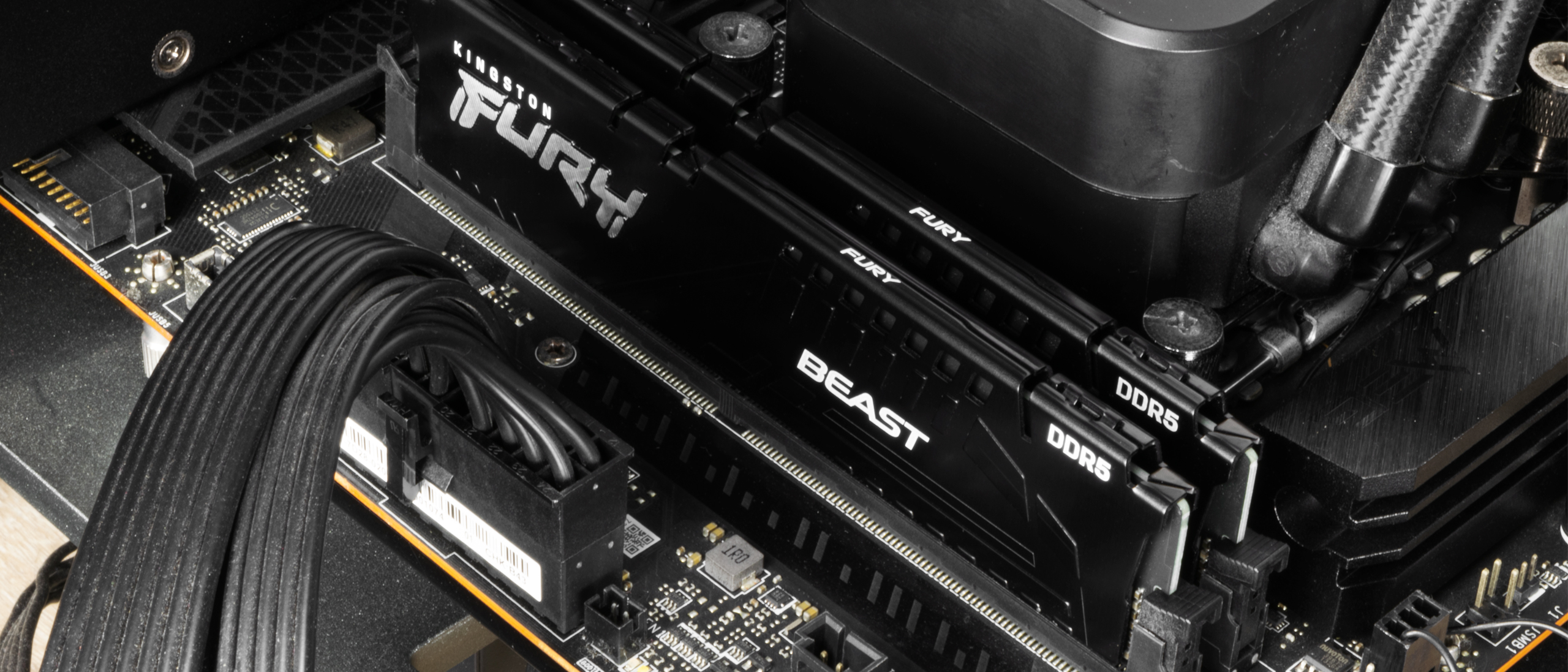Tom's Hardware Verdict
The Fury Beast DDR5-6000 C40 offers a fair balance between performance and capacity, making the memory kit a legitimate option for heavy workloads and multitasking.
Pros
- +
Numerous XMP 3.0 profiles
- +
Compact design
- +
SK hynix A-die ICs for overclocking
Cons
- -
Loose timings
- -
Too expensive
Why you can trust Tom's Hardware
The Fury Beast DDR5-6000 C40 has a fierce name, so there are high expectations that it could rival the best RAM available. Thanks to the inception of DDR5, we have faster and bigger memory modules to fill the memory slots on our motherboards. Although we're not at a point where 32GB (2x16GB) is the new norm, we're going in that direction. If you look around the market, there are far fewer 16GB (2x8GB) DDR5 options on the market than other higher capacities.
DDR5 memory modules will continue to grow in density and eventually provide bigger options for users. In the meantime, 64GB (2x32GB) is still a lot of memory for the average mainstream consumer. We’ve put the Fury Beast DDR5-6000 C40 memory kit from Kingston through its paces to see whether it's the 64GB memory kit for you.
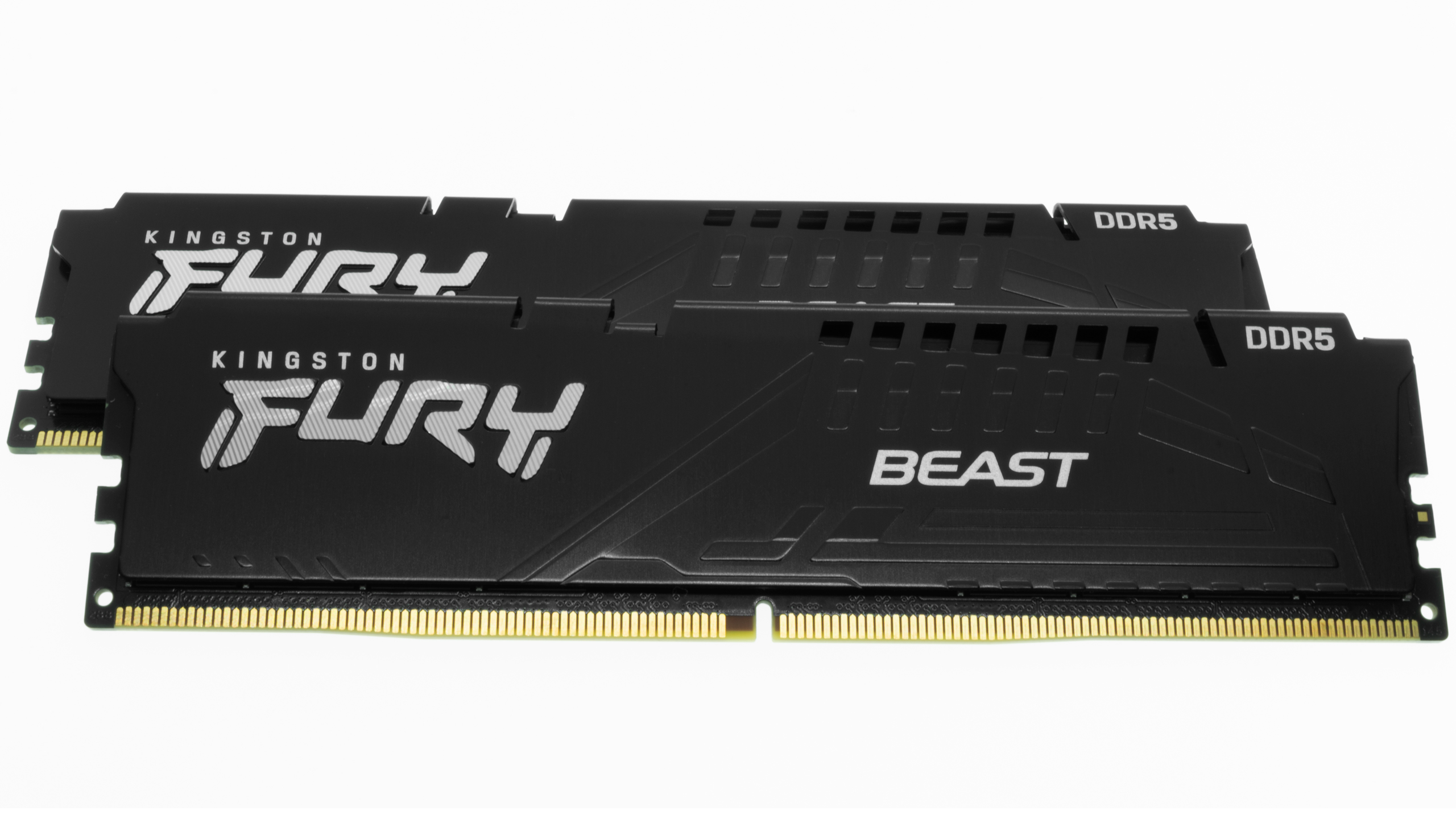
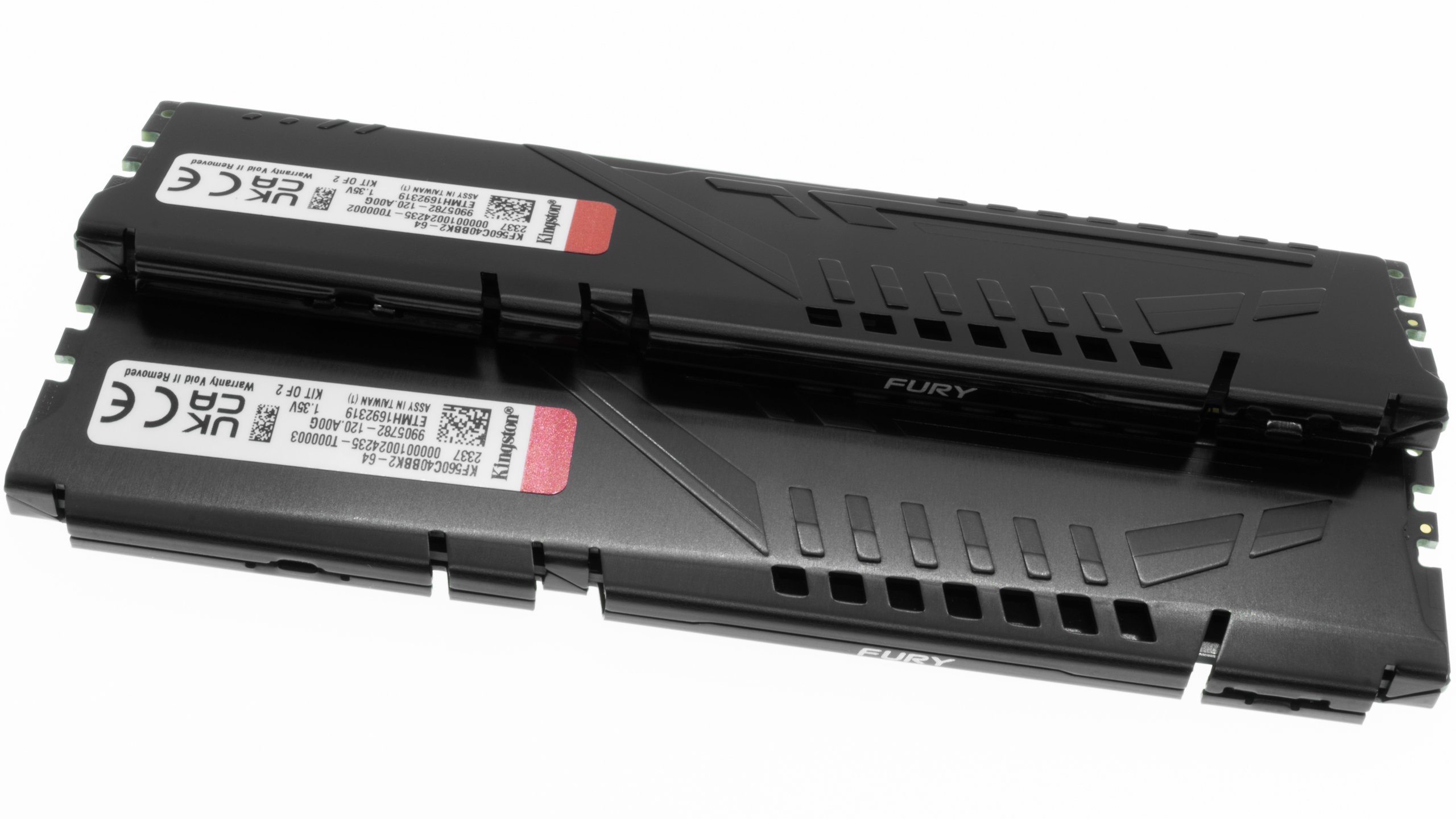
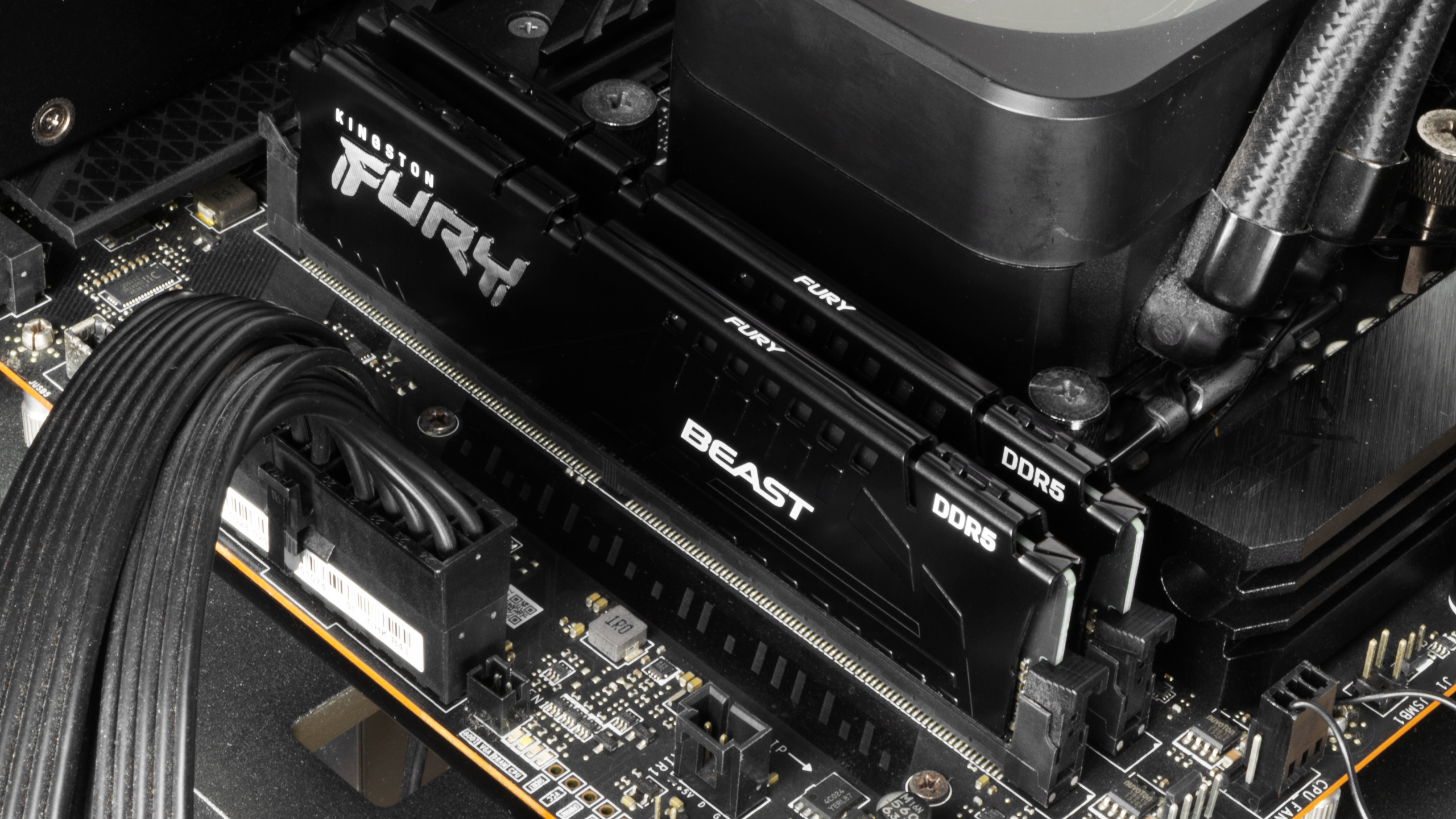
The Fury Beast DDR5's aluminum heat spreader revolves around a combination of different angles and shapes. While there isn't a predominant pattern, Kingston put a fair share of marketing on the heat spreader. The memory modules come in either black or white. Initially, the Fury Beast DDR5 wasn't available with RGB lighting, but Kingston later introduced the Fury Beast DDR5 RGB for users who want more pizzazz with their memory. The RGB comes with a small premium, of course.
Kingston sticks to a low-profile design for the Fury Beast DDR5 lineup, a decision carried over from the previous Fury Beast DDR4 days. At 34.9mm (1.37 inches) tall, the DDR5 memory modules shouldn't get in the way of large CPU air coolers. In contrast, the RGB version (42.23mm or 1.66 inches) is 21% taller, and while it's not oversized, that specific model may warrant a clearance check if you have very little headroom under your CPU cooler.
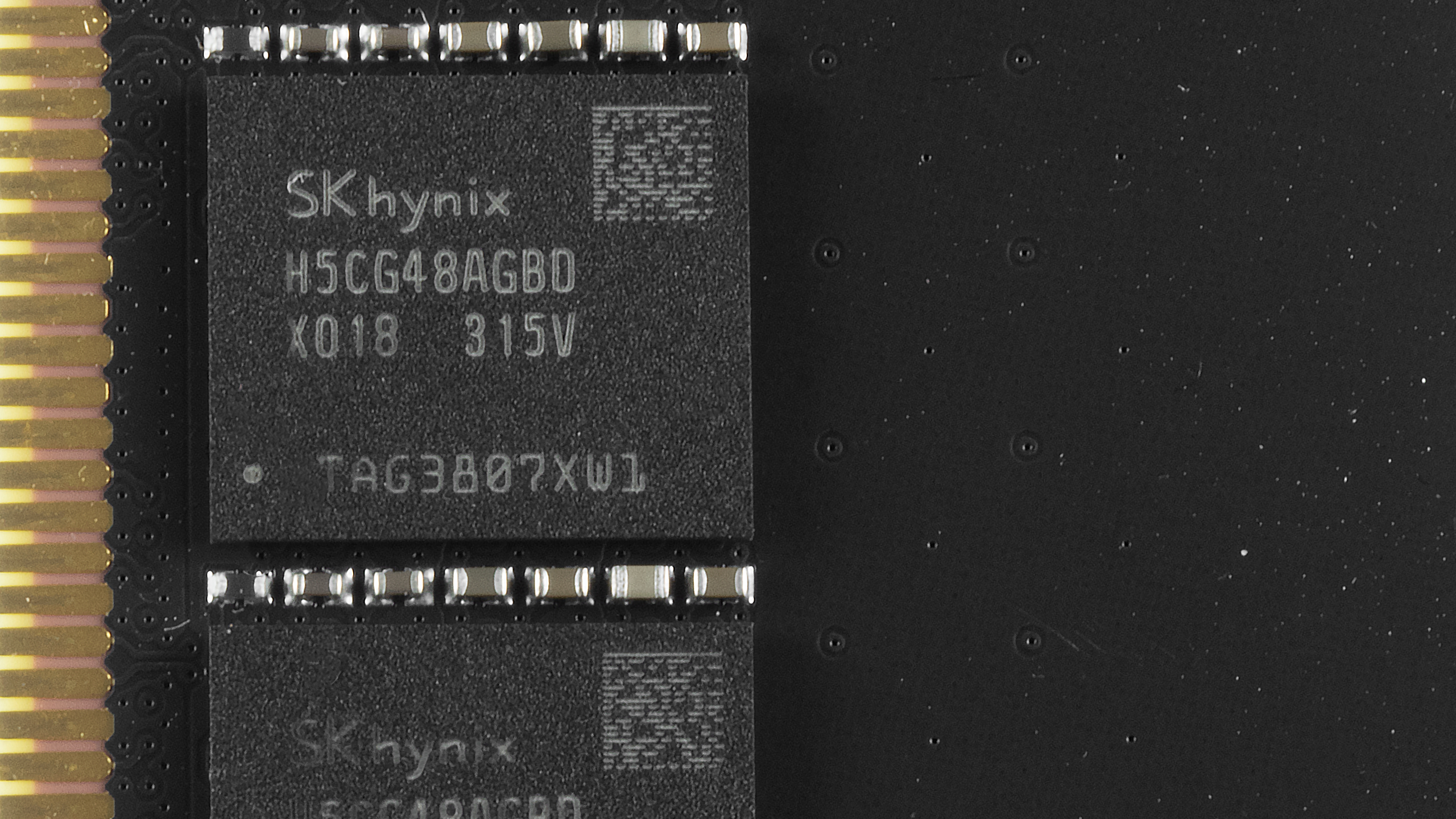
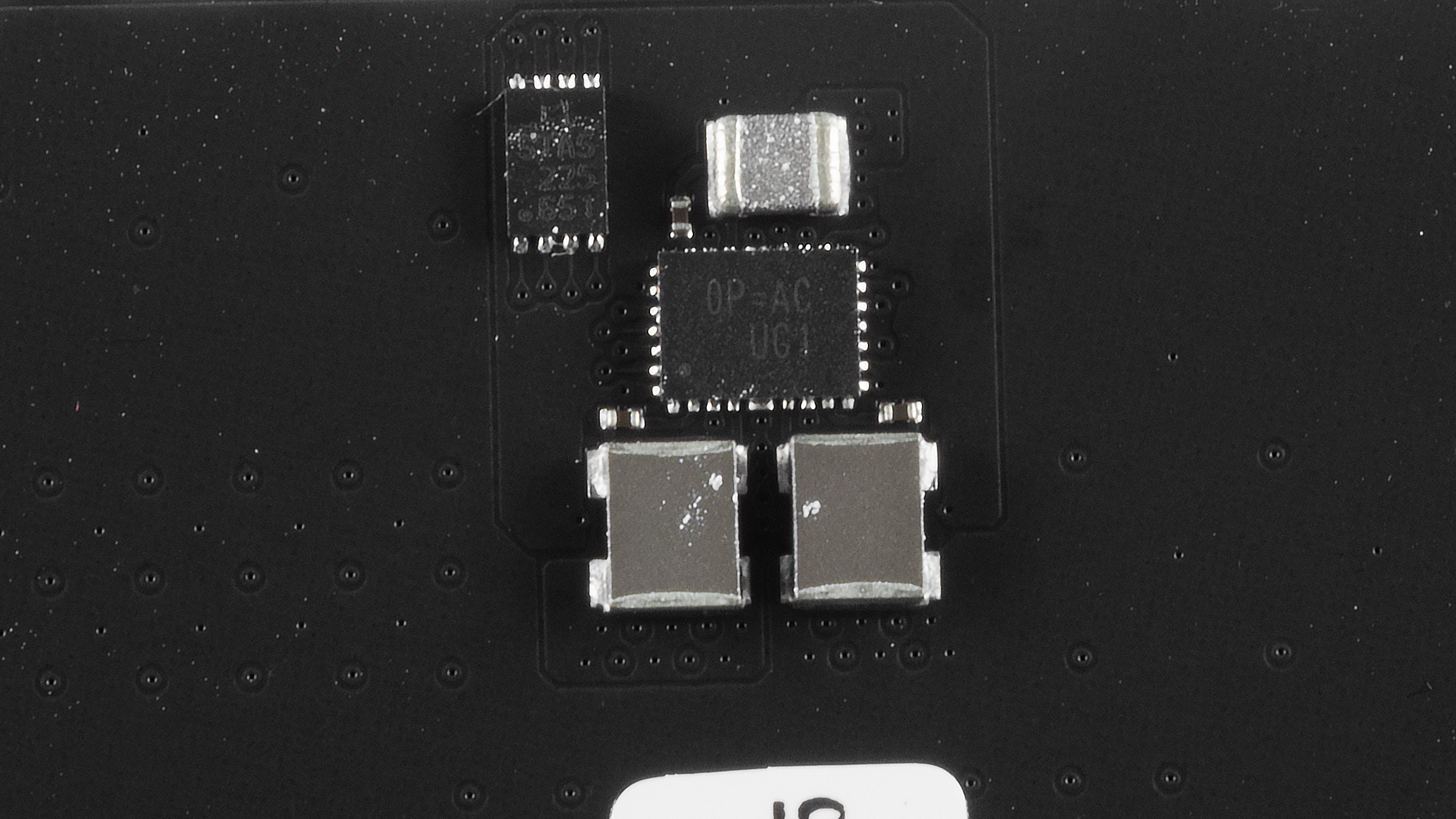
The memory kit contains two 32GB DDR5 memory modules, each featuring a dual-rank design. Removing the heat spreader gives us access to the black PCB, home to SK hynix's H5CG48AGBDX018 (A-die) integrated circuits (ICs). Kingston placed eight 2GB ICs on each side of the PCB, amounting to 16 ICs per memory module. The power management IC (PMIC) is the 0P=AC UG1, which is becoming a popular vendor option. Richtek is the manufacturer behind that particular PMIC.
Like other overclocked memory kits, the Fury Beast DDR5 defaults to the baseline DDR5-4800 standard. The timings are 40-39-39-77. The memory modules come with three factory-configured XMP 3.0 profiles. The DDR5-6000 and DDR5-5600 profiles share the exact 40-40-40-80 timings. The former, however, commands 1.35V, whereas the latter is happy with 1.25V. The third profile is a more optimized DDR5-4800 one with timings set to 38-38-38-70 with 1.1V. See our PC Memory 101 feature and How to Shop for RAM story for more timings and frequency considerations.
Comparison Hardware
| Memory Kit | Part Number | Capacity | Data Rate | Primary Timings | Voltage | Warranty |
|---|---|---|---|---|---|---|
| Corsair Dominator Titanium First Edition | CMP64GX5M2X6600C32FEW | 2 x 32GB | DDR5-6600 (XMP) | 32-39-39-76 (2T) | 1.40 | Lifetime |
| G.Skill Trident Z5 RGB | F5-6400J3239G32GX2-TZ5RW | 2 x 32GB | DDR5-6400 (XMP) | 32-39-39-102 (2T) | 1.40 | Lifetime |
| Kingston Fury Beast | KF560C40BBK2-64 | 2 x 32GB | DDR5-6000 (XMP) | 40-40-40-80 (2T) | 1.35 | Lifetime |
Our Intel test system runs the Core i9-13900K on the MSI MEG Z690 Unify-X with the 7D28vAF firmware. In contrast, the AMD system pairs the Ryzen 7 7700X with the MSI MPG X670E Carbon WiFi updated to the 7D70v1E5 firmware. The Corsair CUE H100i Elite LCD liquid cooler keeps our Raptor Lake and Zen 4 processor operating temperatures under check.
Get Tom's Hardware's best news and in-depth reviews, straight to your inbox.
The MSI GeForce RTX 4080 16GB Gaming X Trio tackles the more graphics-intensive workloads, ensuring that there isn't a graphics bottleneck in our gaming RAM benchmarks. The Windows 11 installation, benchmarking software, and games reside on Crucial's MX500 SSDs. Meanwhile, the Corsair RM1000x Shift ATX 3.0 power supply provides our systems with clean and abundant power, directly feeding the GeForce RTX 4080 with a native 16-pin (12VHPWR) power cable. Lastly, the Streacom BC1 open-air test bench is vital to organizing our hardware.
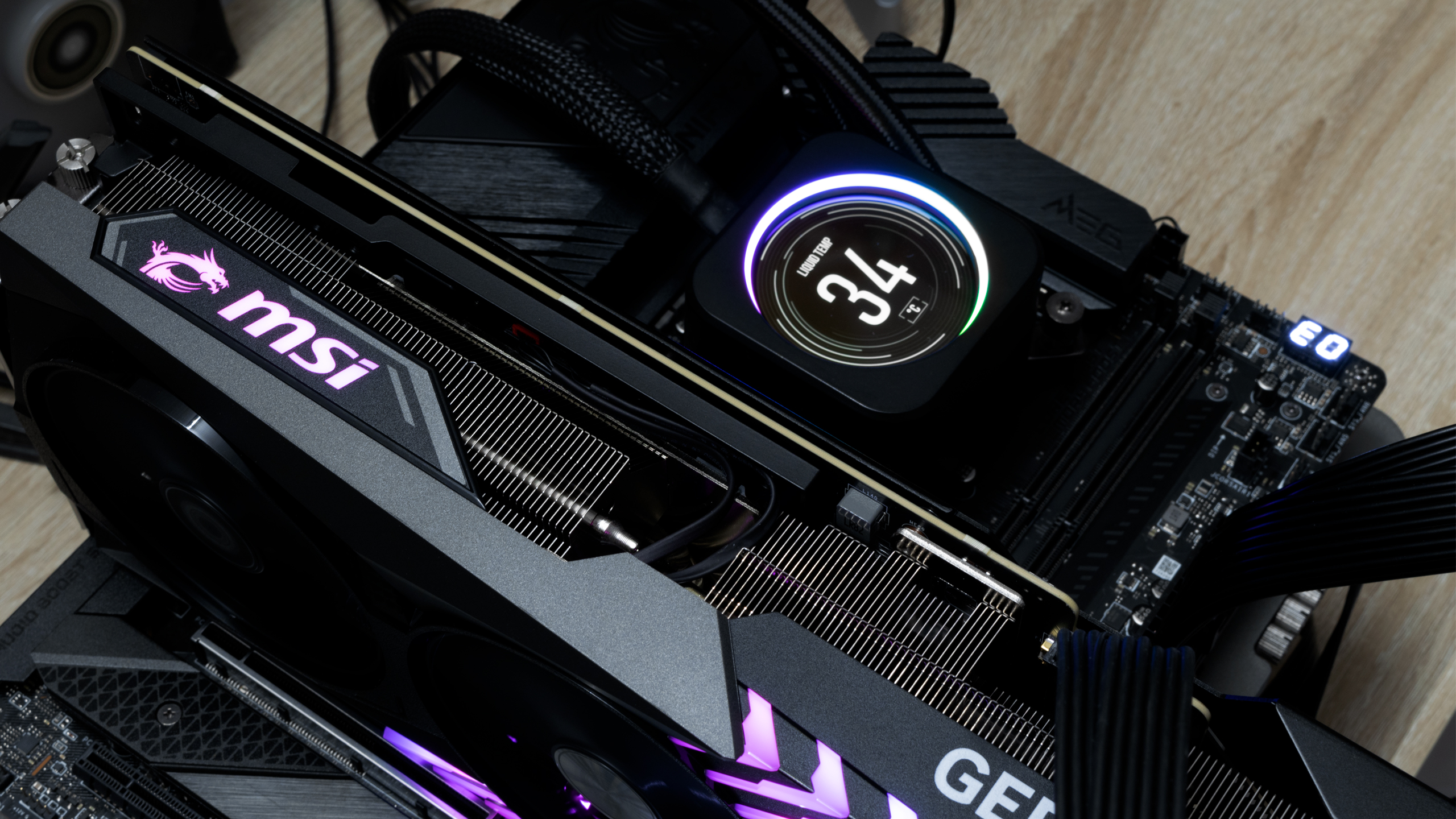
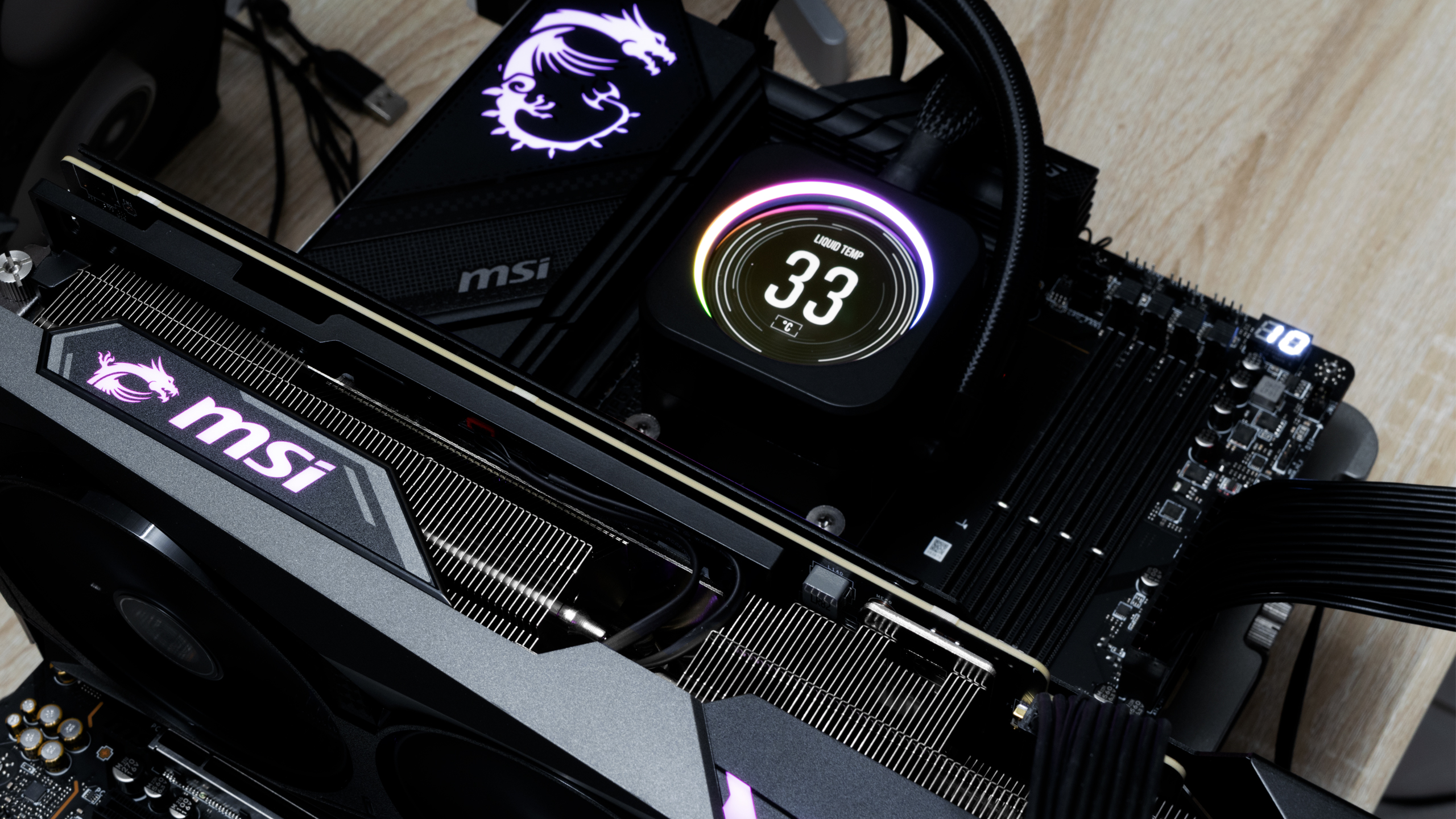
| Component | Intel System | AMD System |
|---|---|---|
| Processor | Intel Core i9-13900K | AMD Ryzen 7 7700X |
| Motherboard | MSI MEG Z690 Unify-X | MSI MPG X670E Carbon WiFi |
| Graphics Card | MSI GeForce RTX 4080 16GB Gaming X Trio | MSI GeForce RTX 4080 16GB Gaming X Trio |
| Storage | Crucial MX500 500GB, 2TB | Crucial MX500 500GB, 2TB |
| Cooling | Corsair iCUE H100i Elite LCD | Corsair iCUE H100i Elite LCD |
| Power Supply | Corsair RM1000x Shift | Corsair RM1000x Shift |
| Case | Streacom BC1 | Streacom BC1 |
Intel Performance
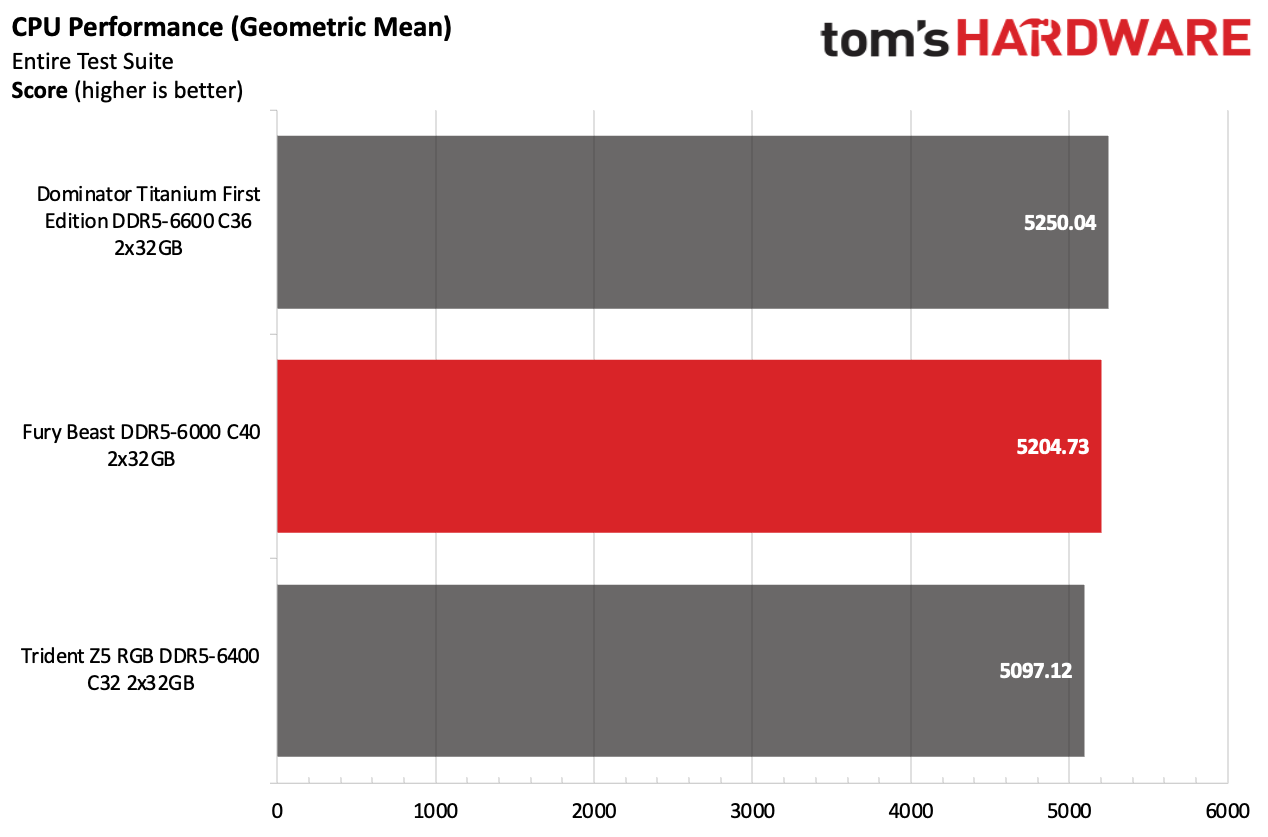
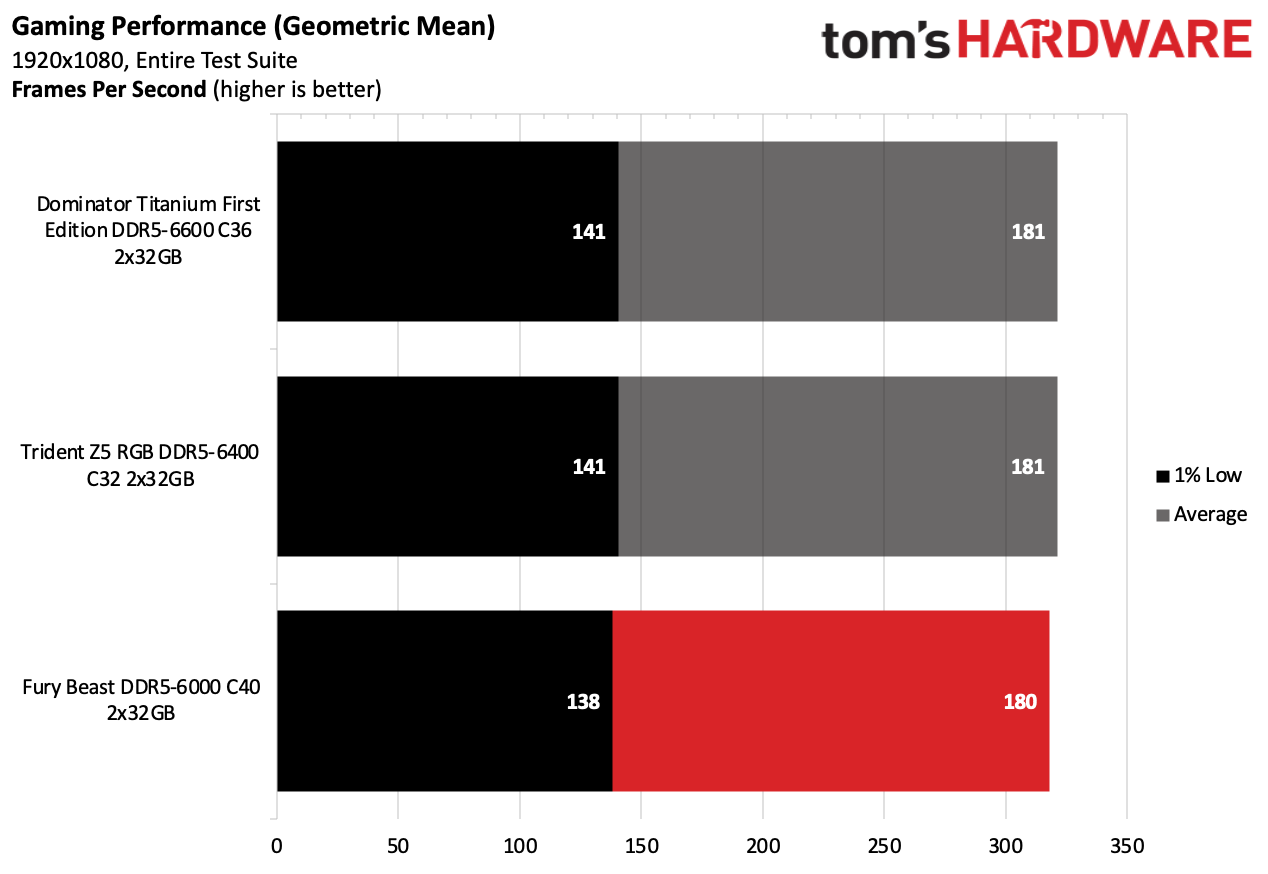
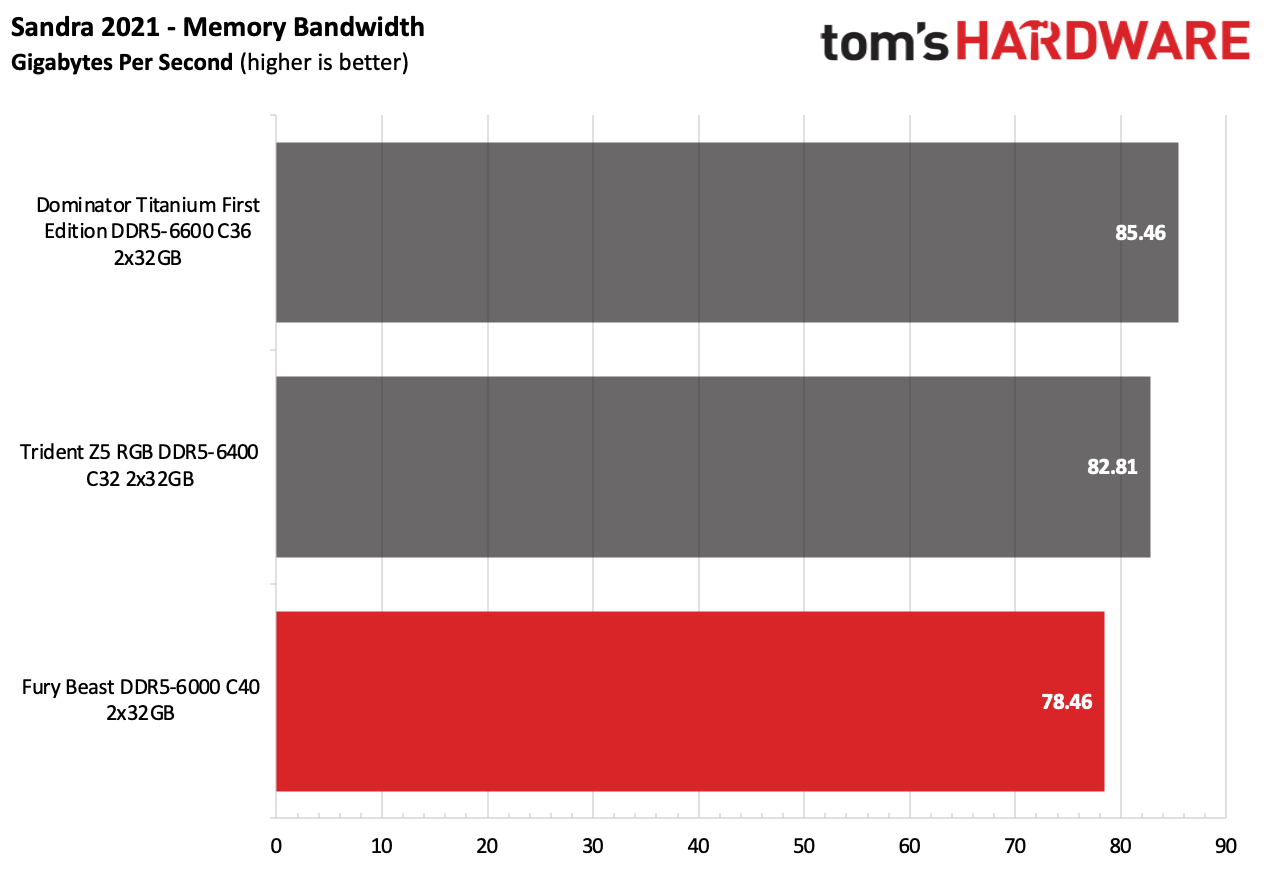
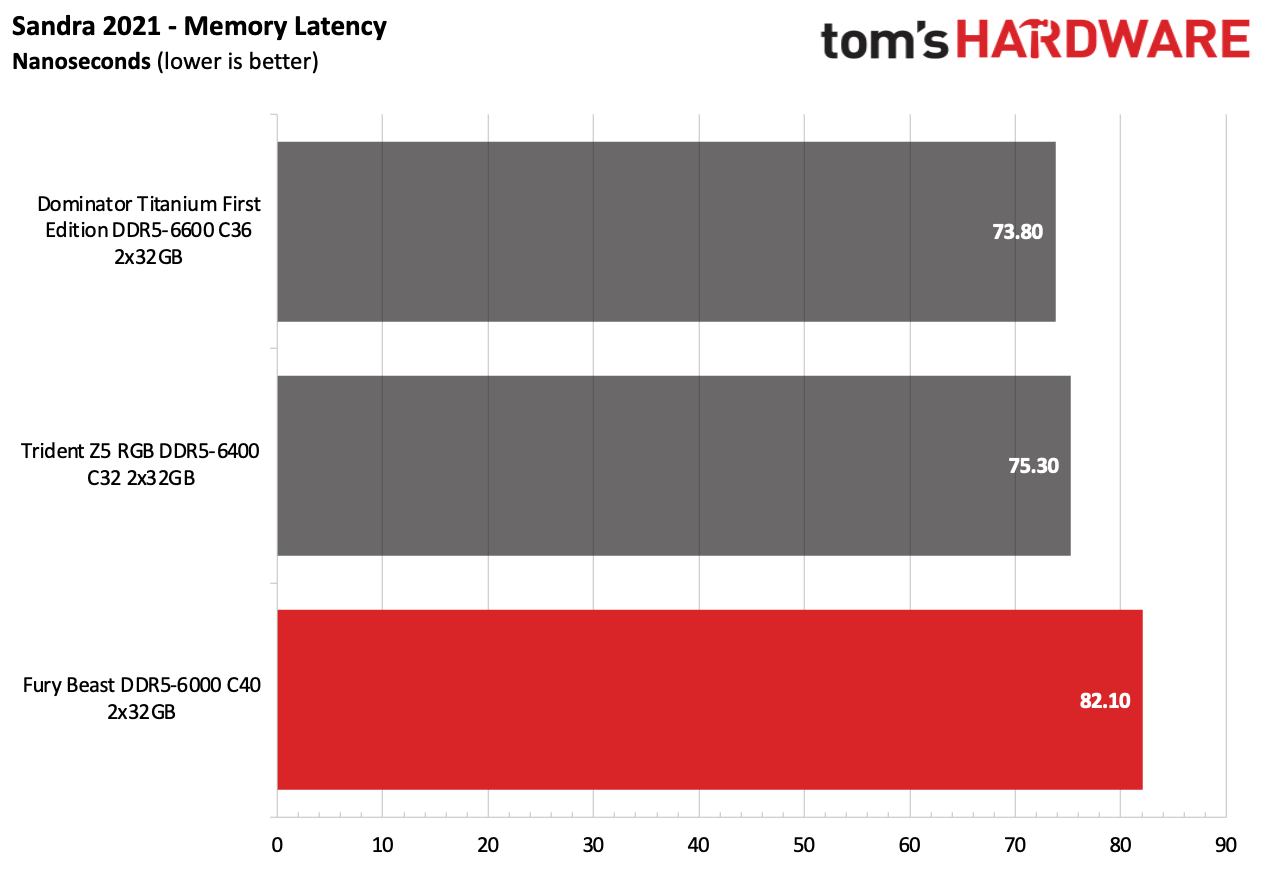
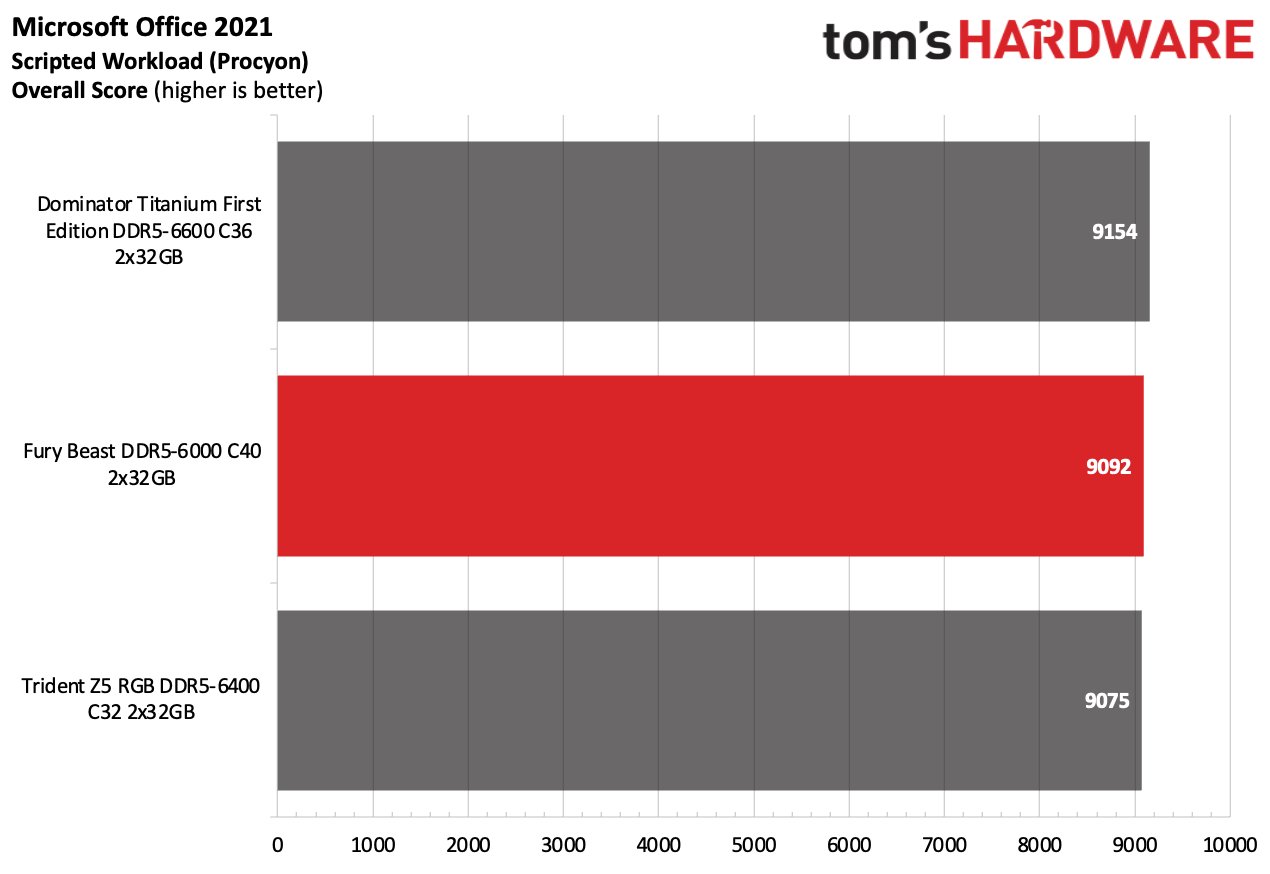
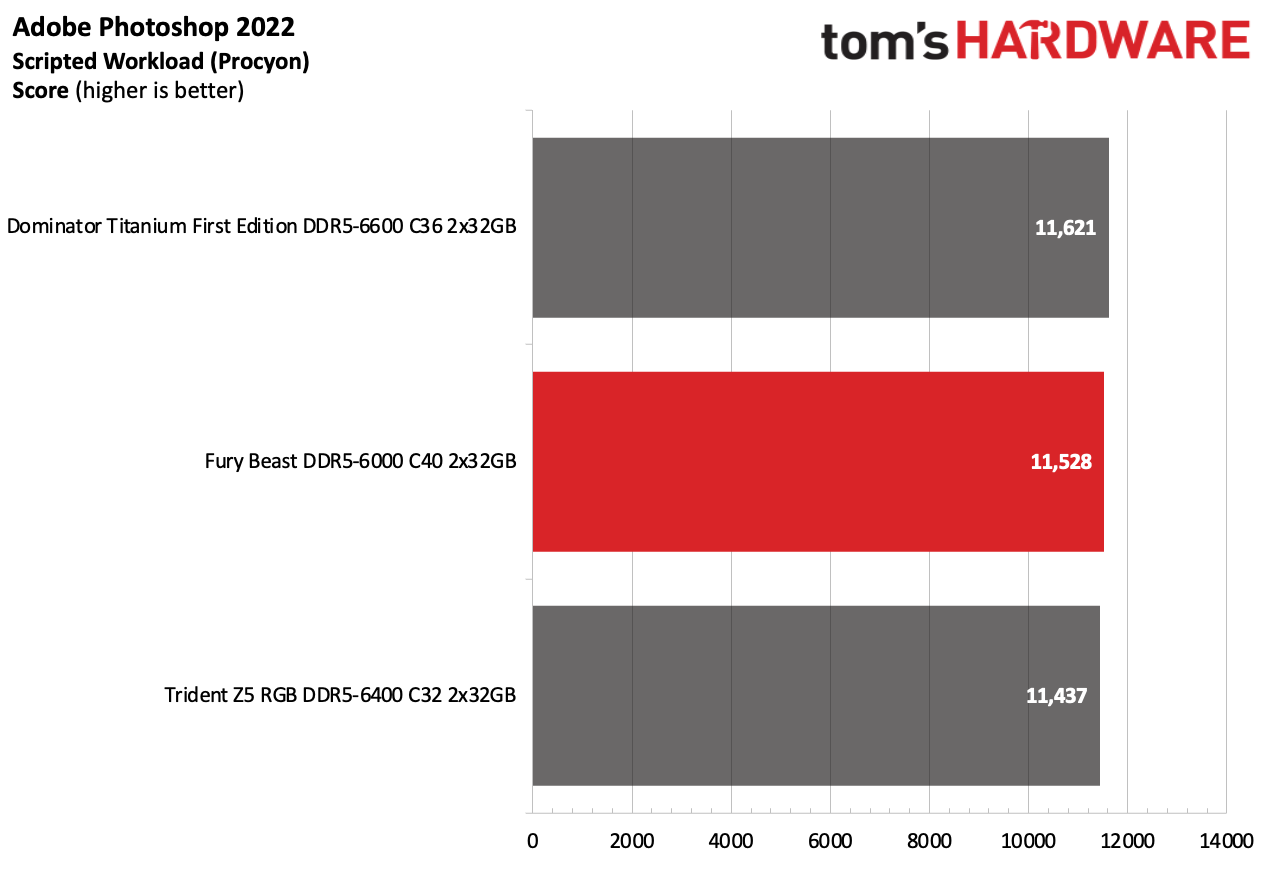
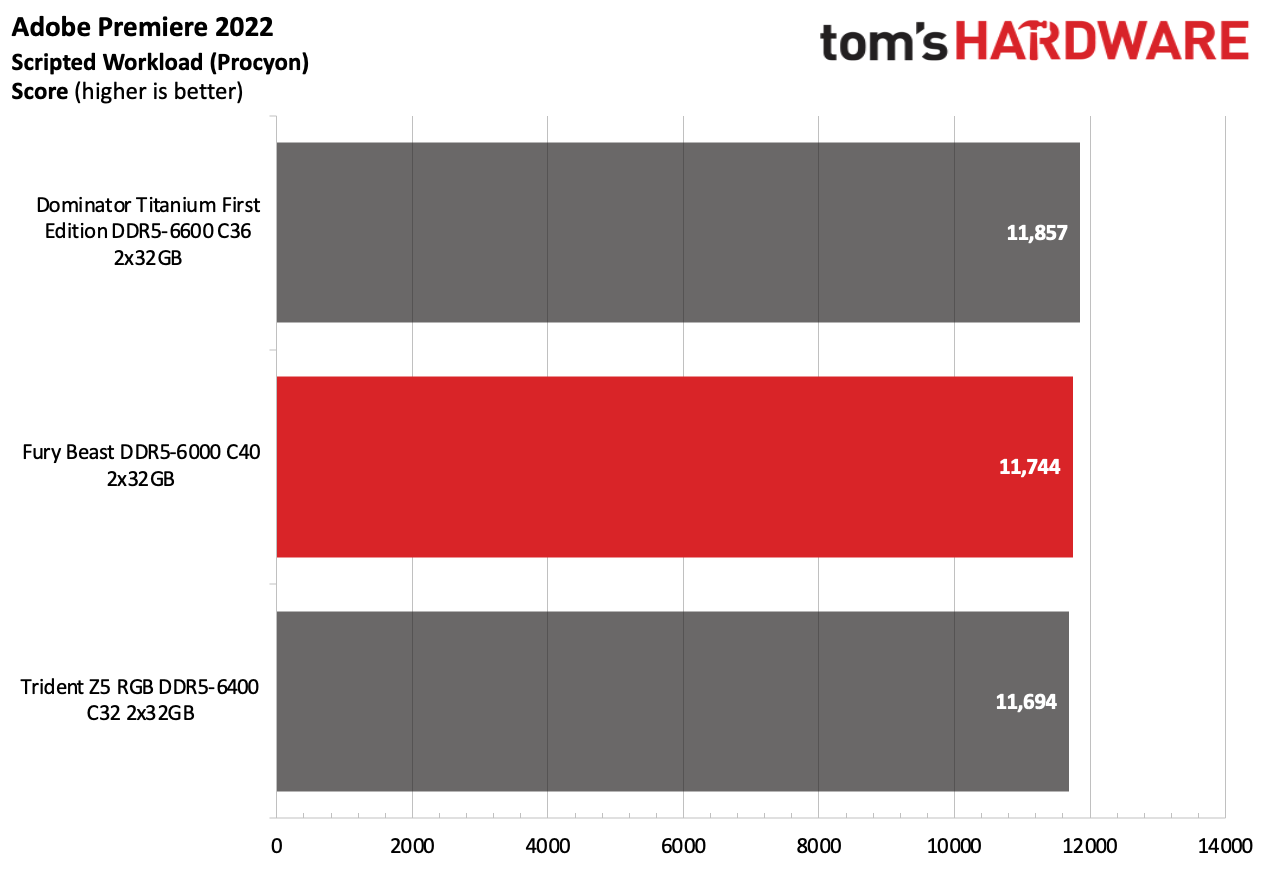
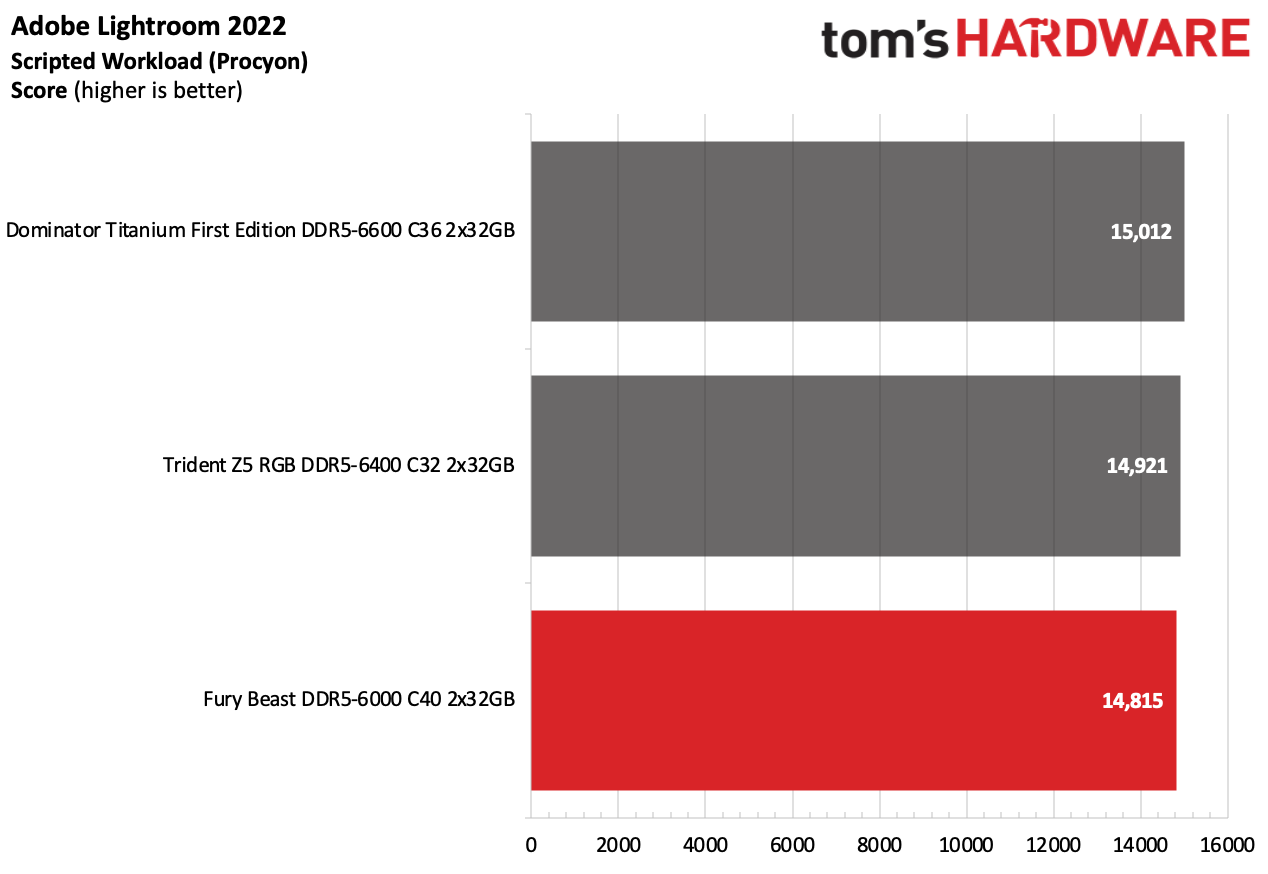
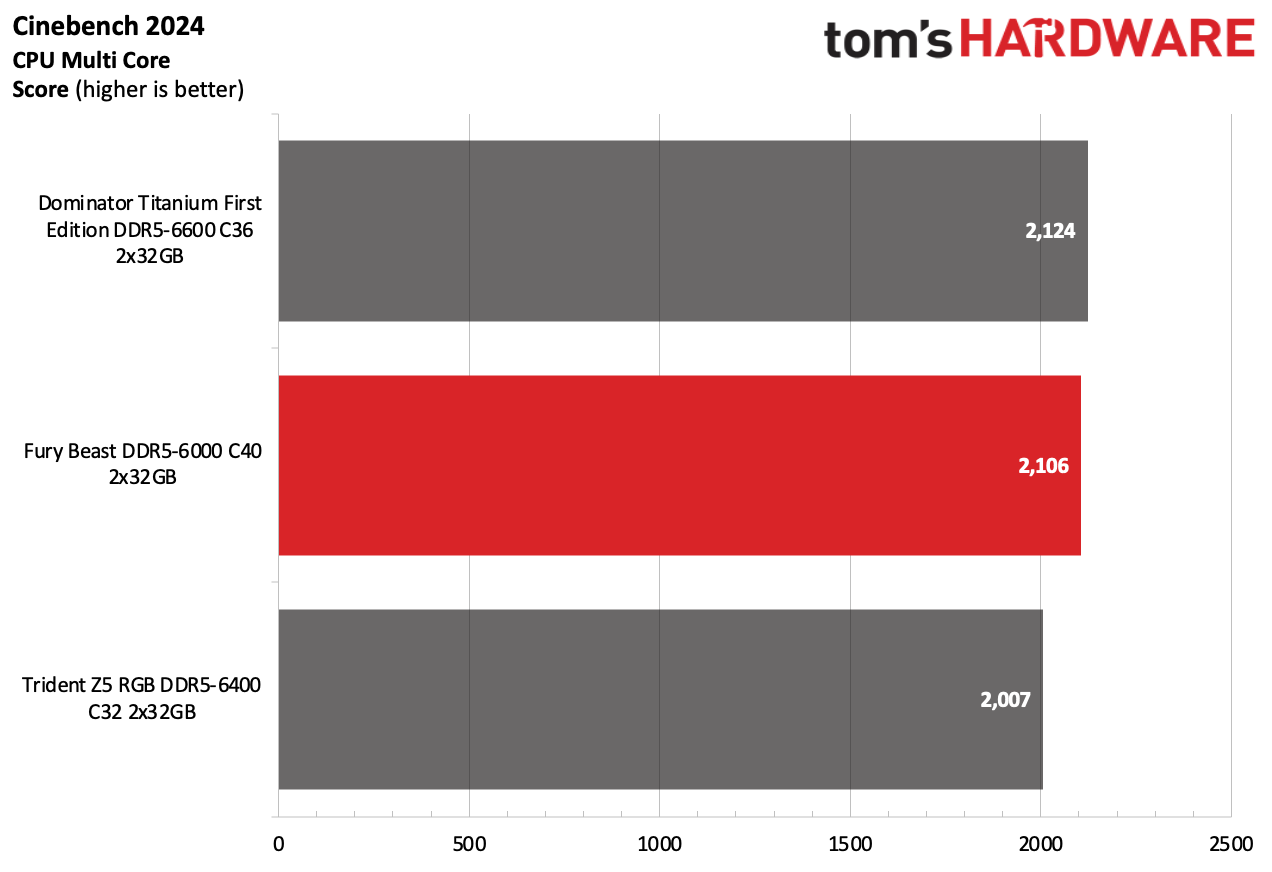
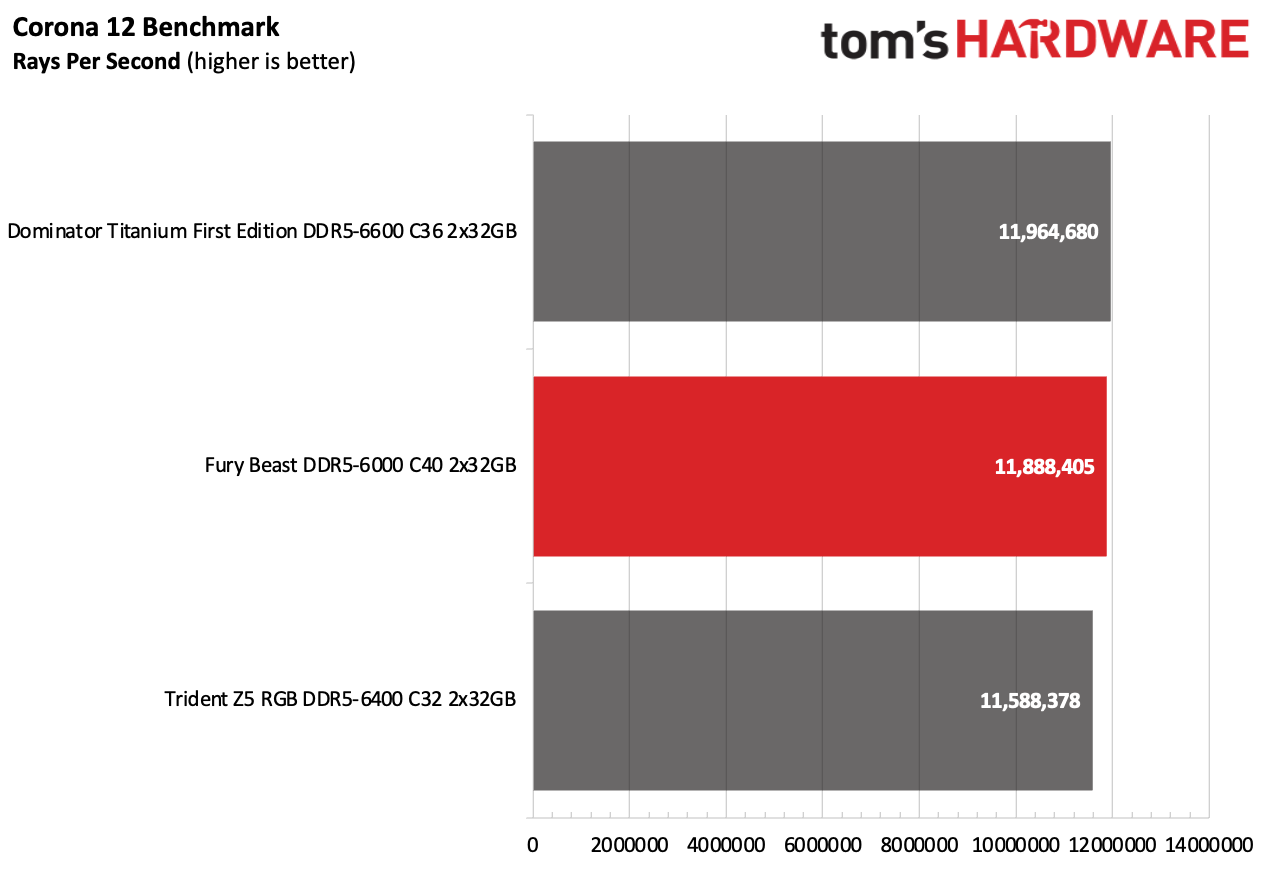
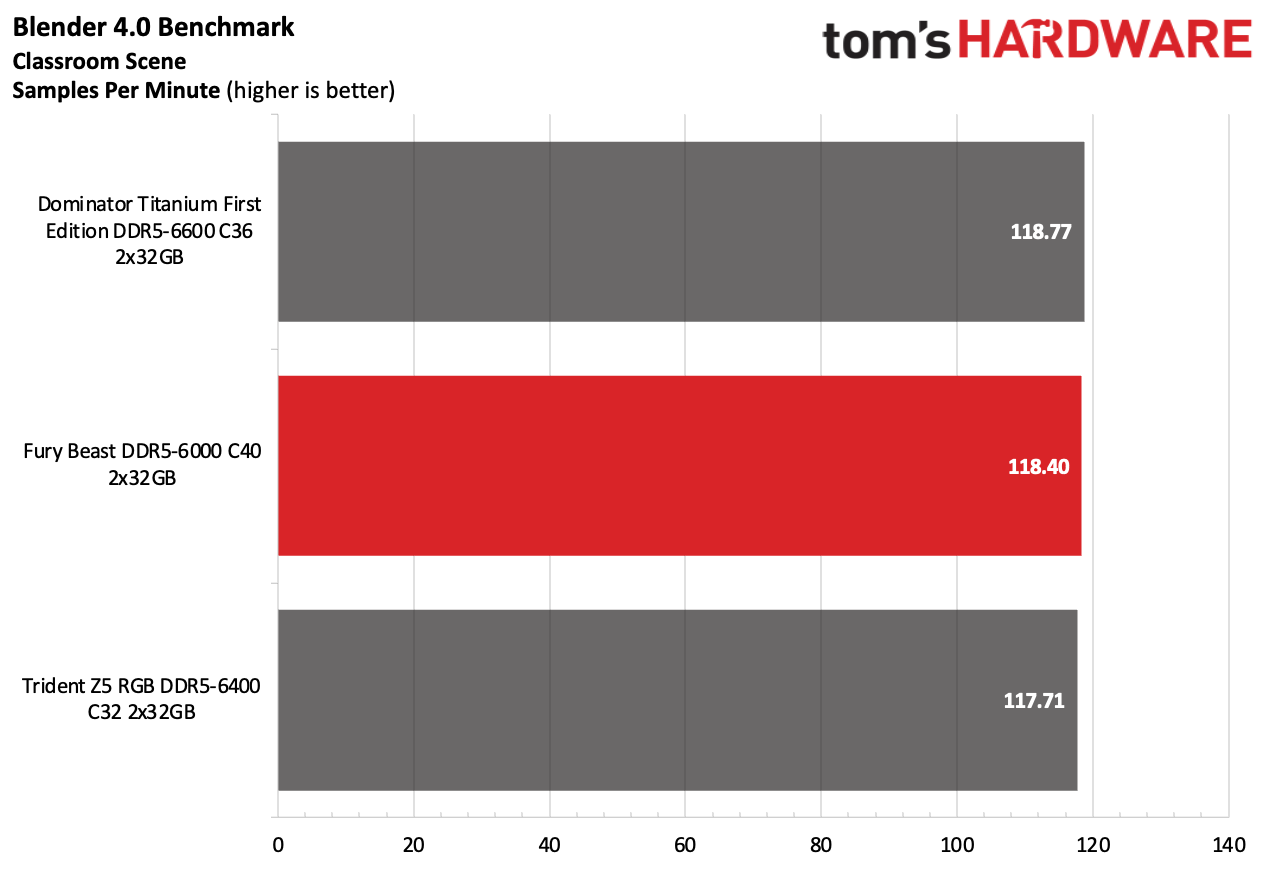
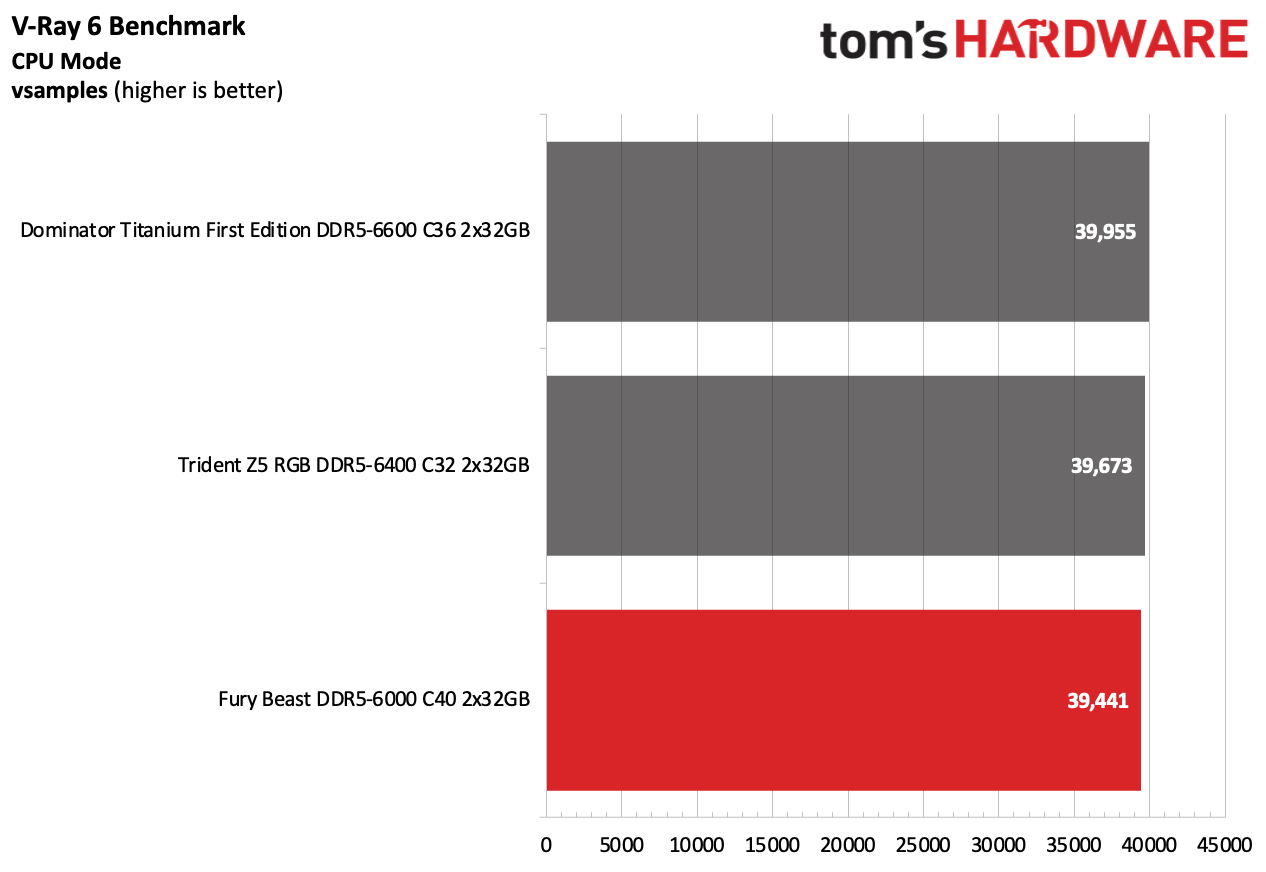
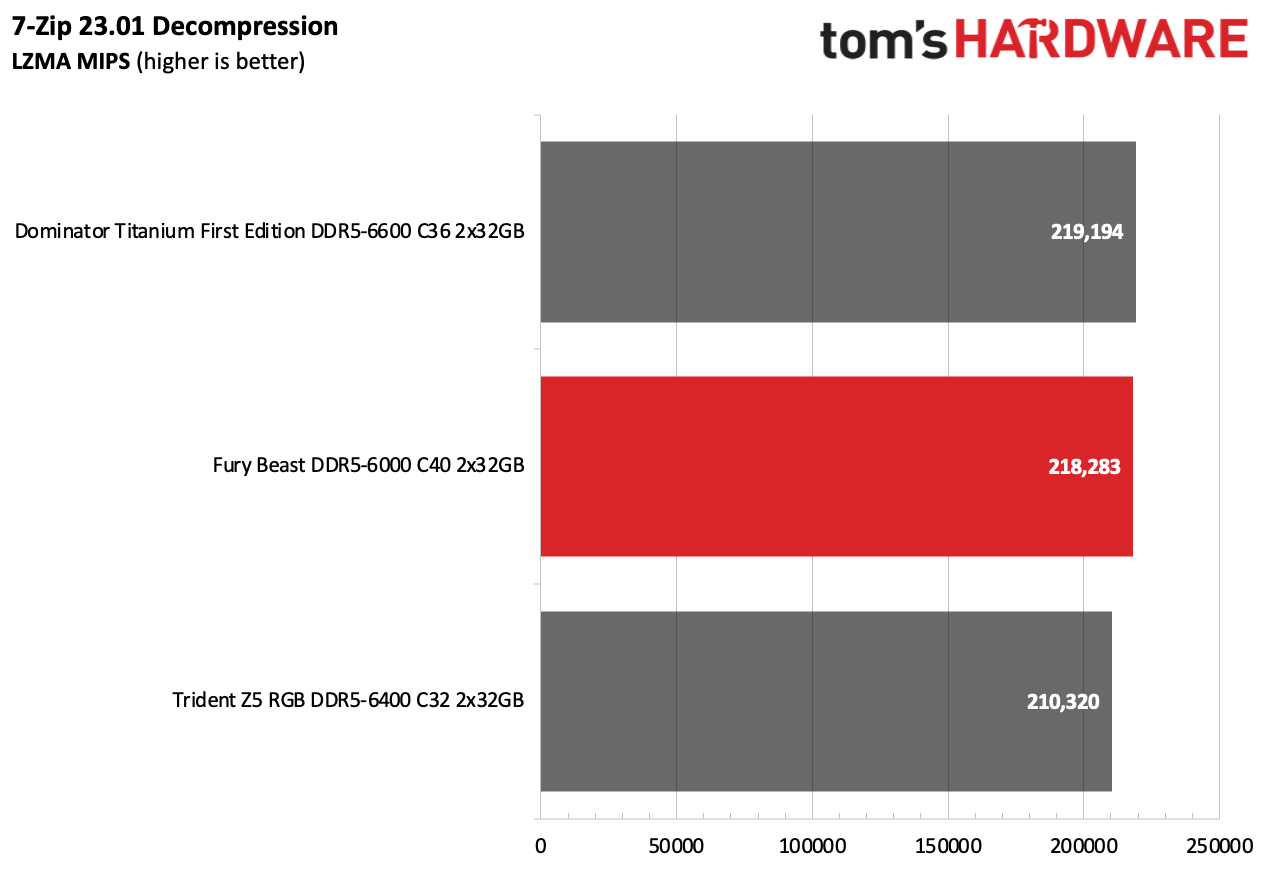
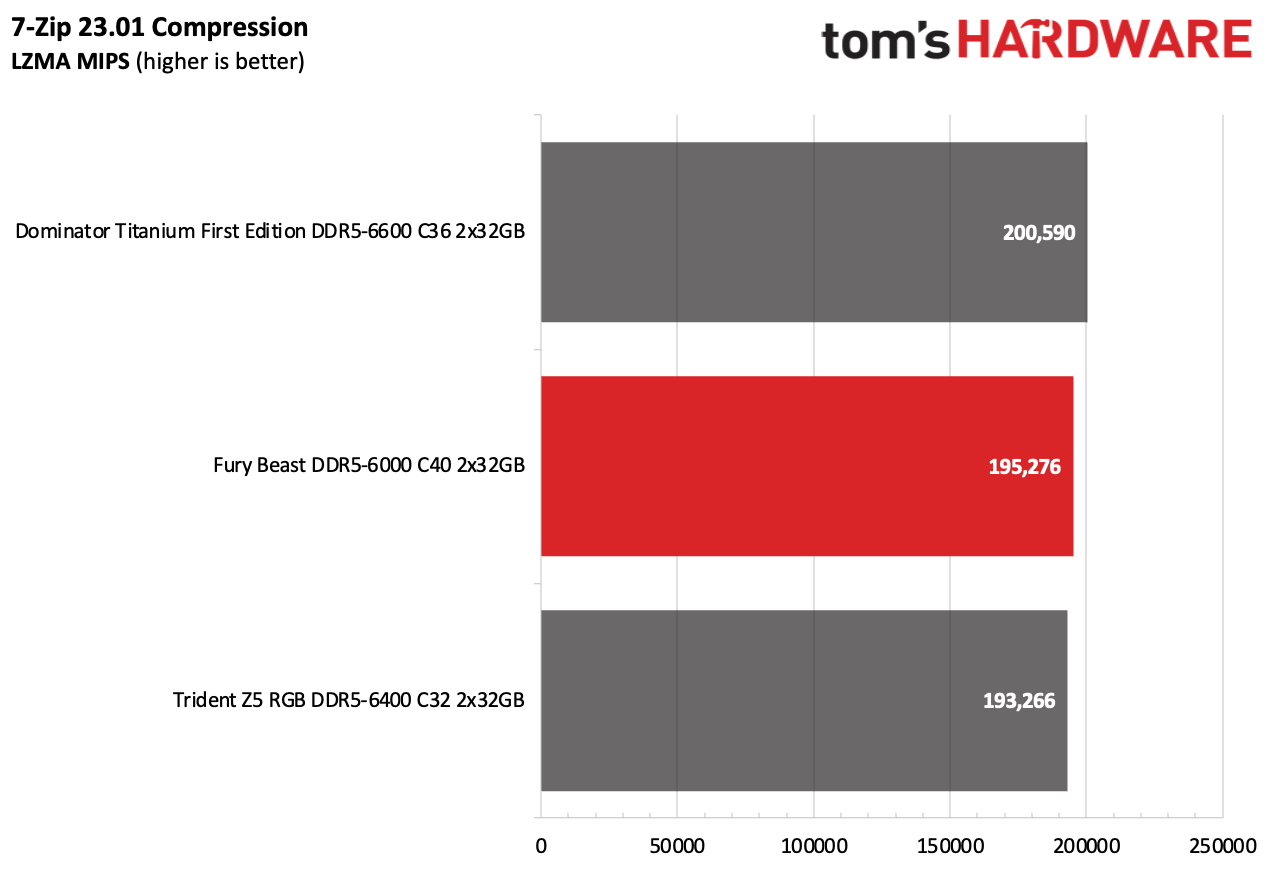
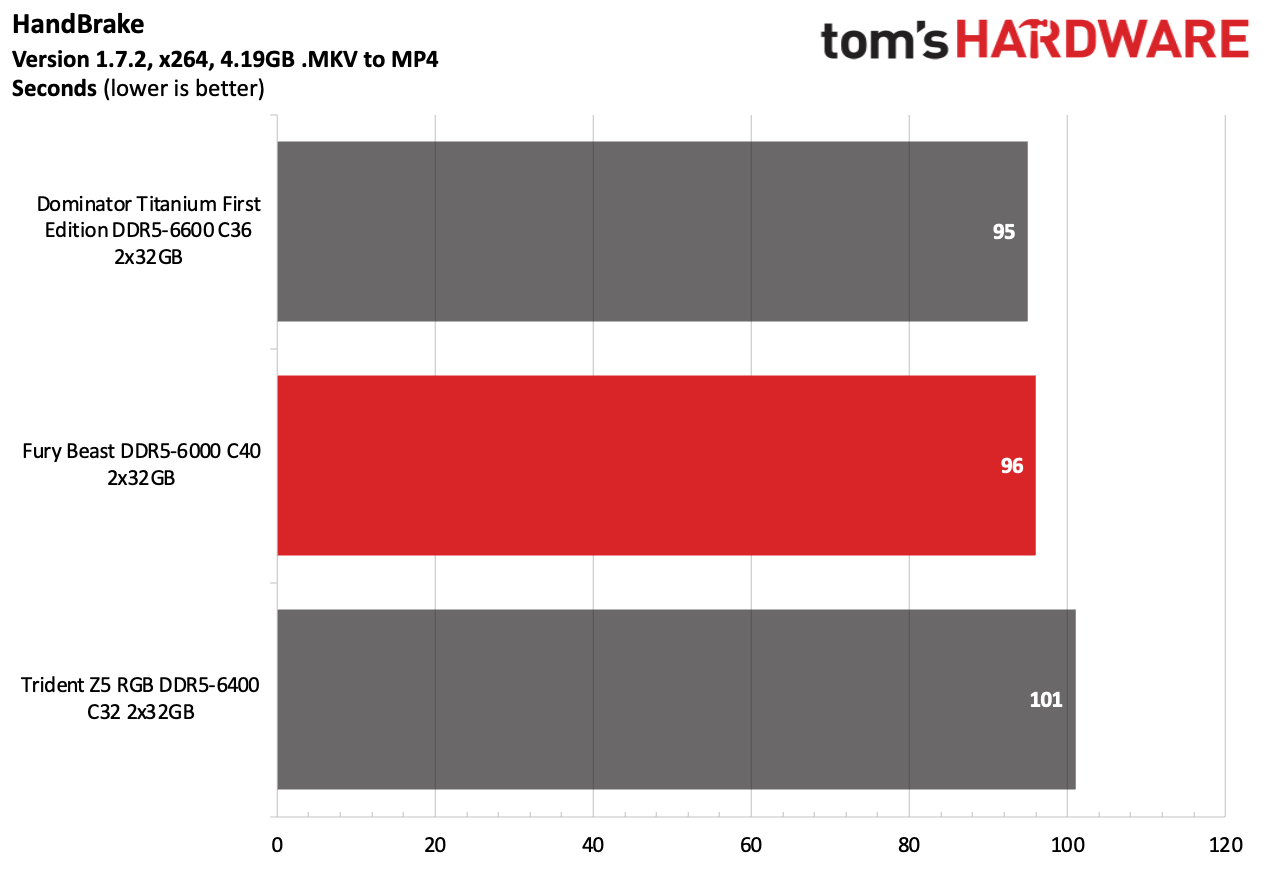
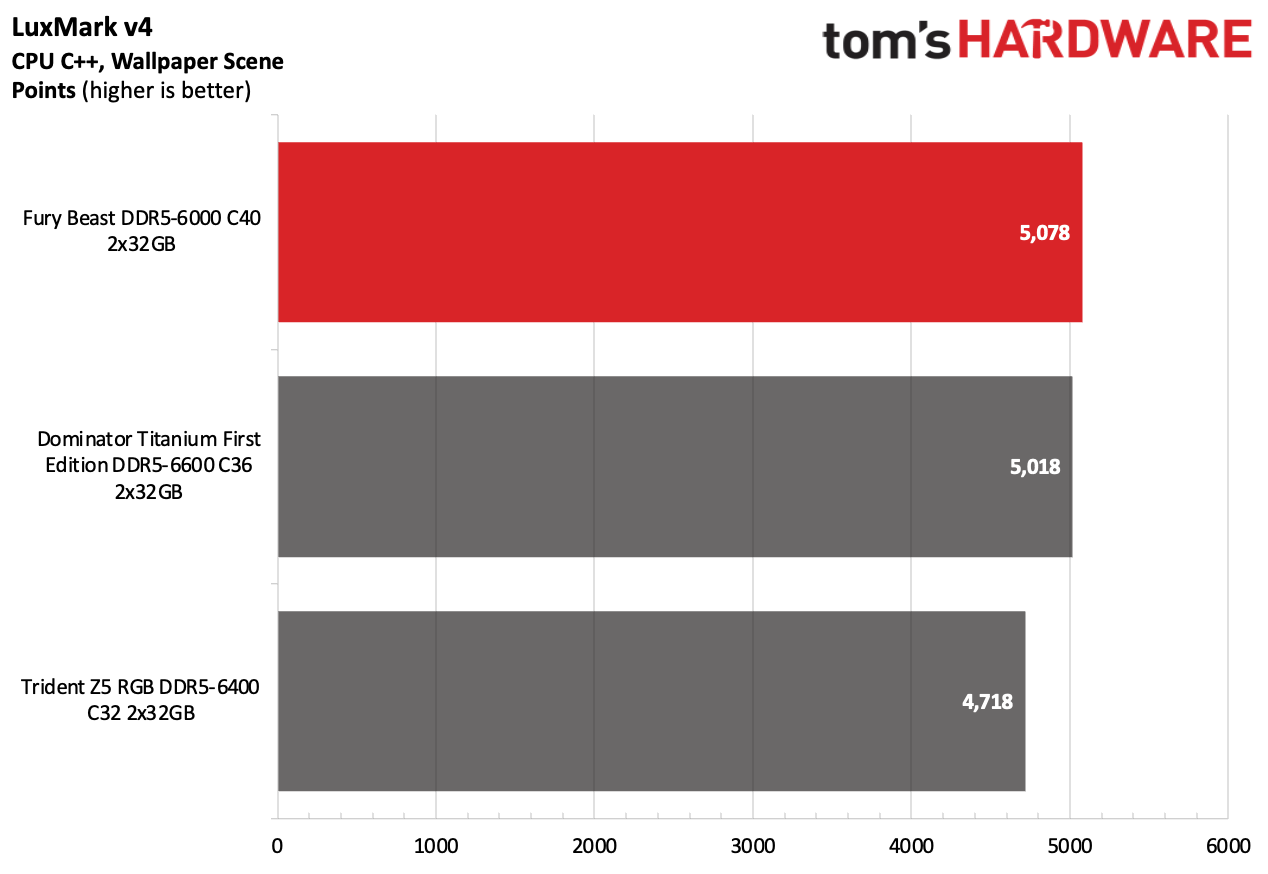
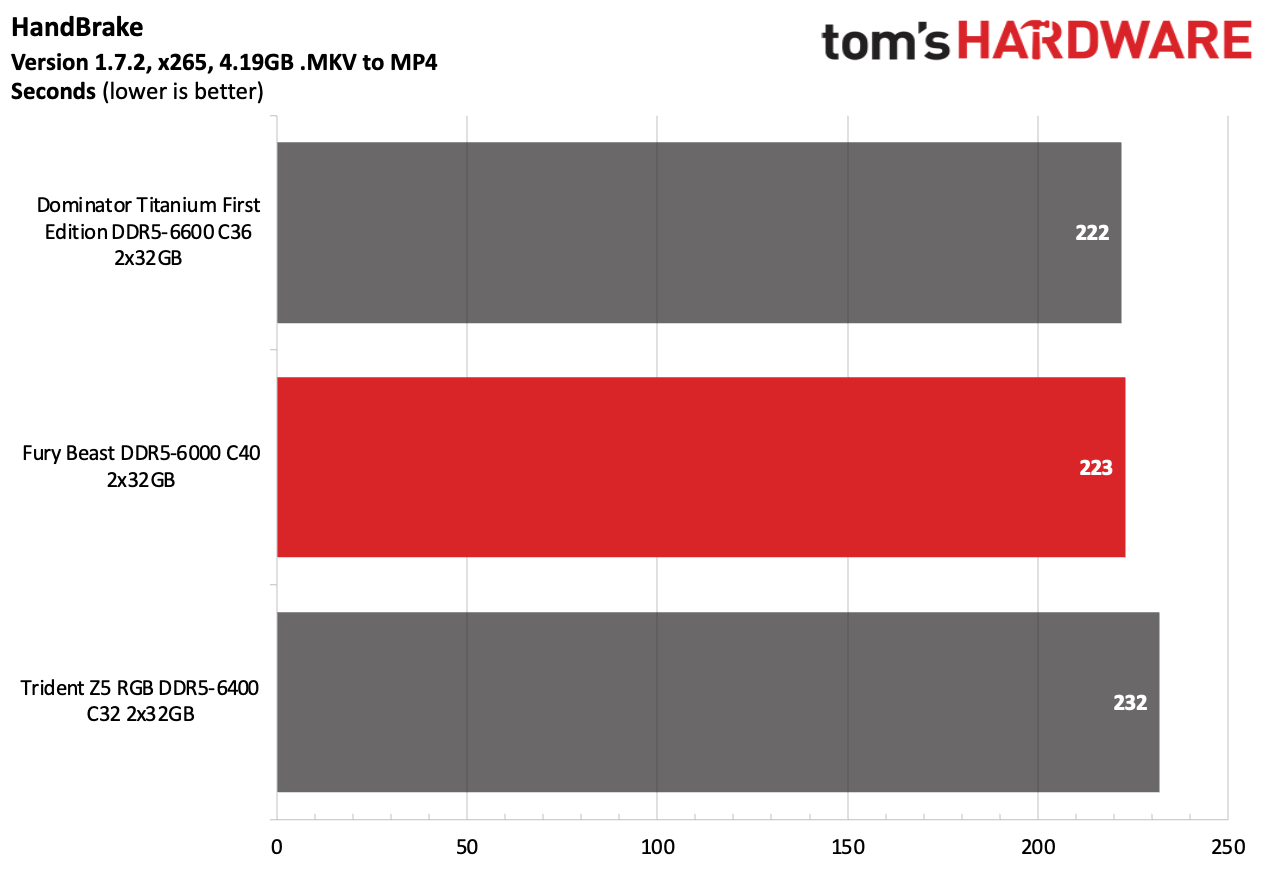
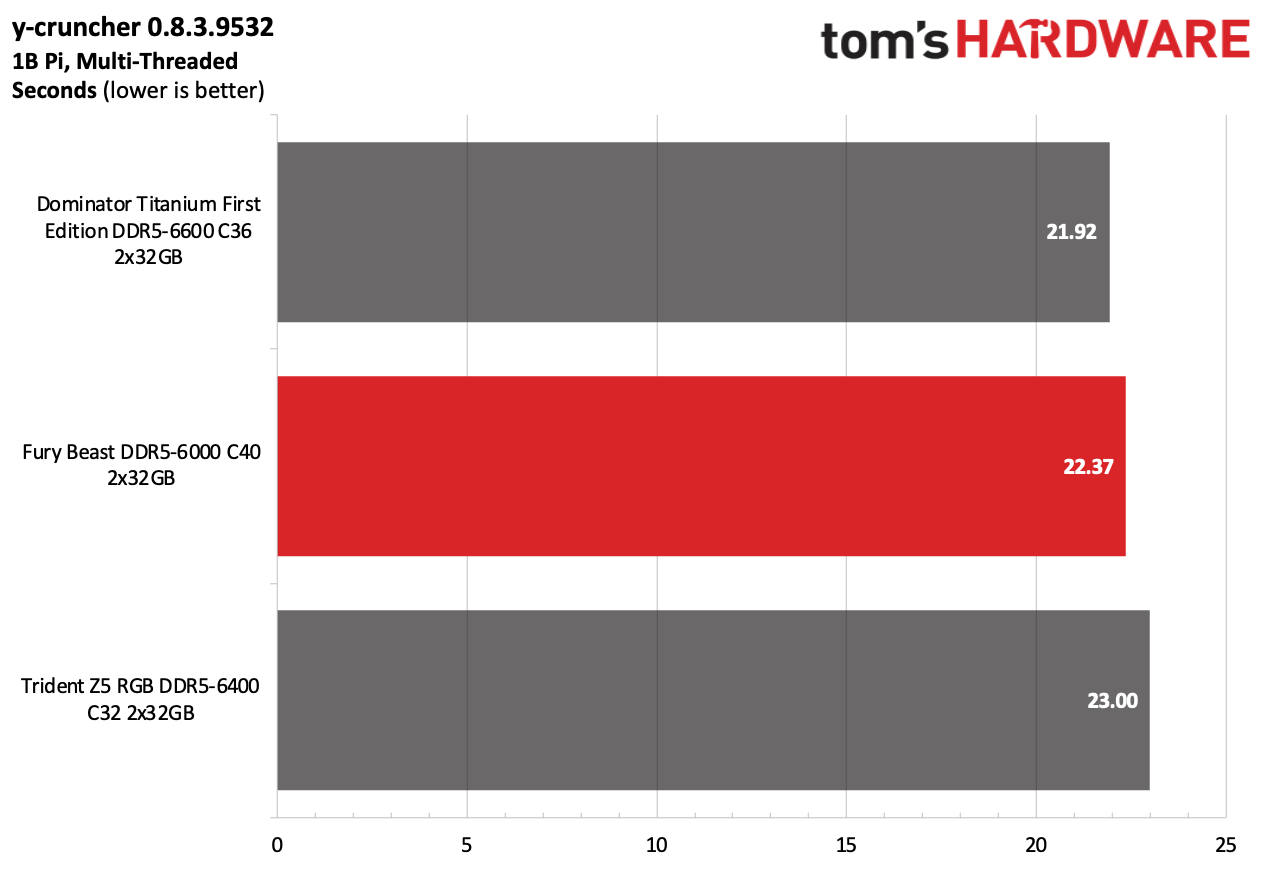
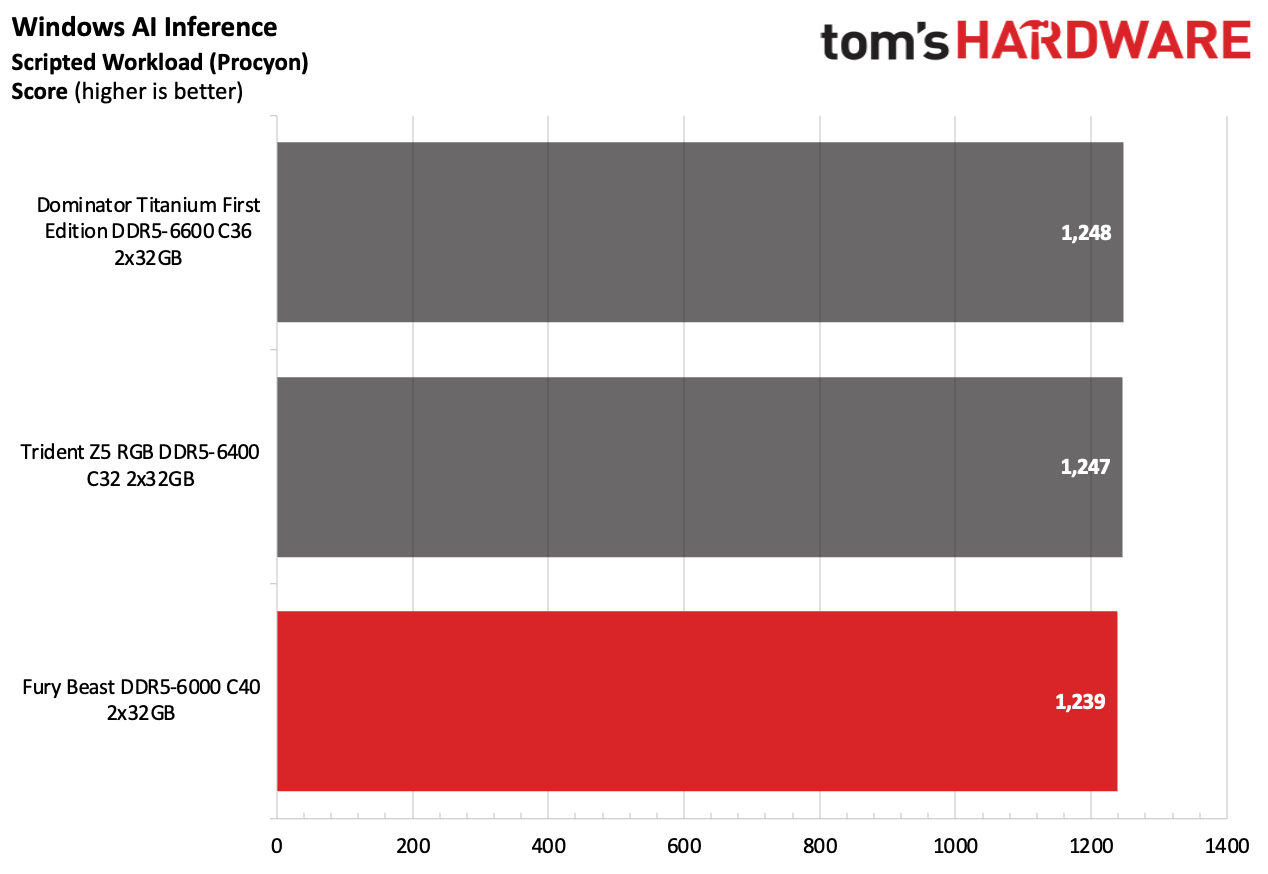
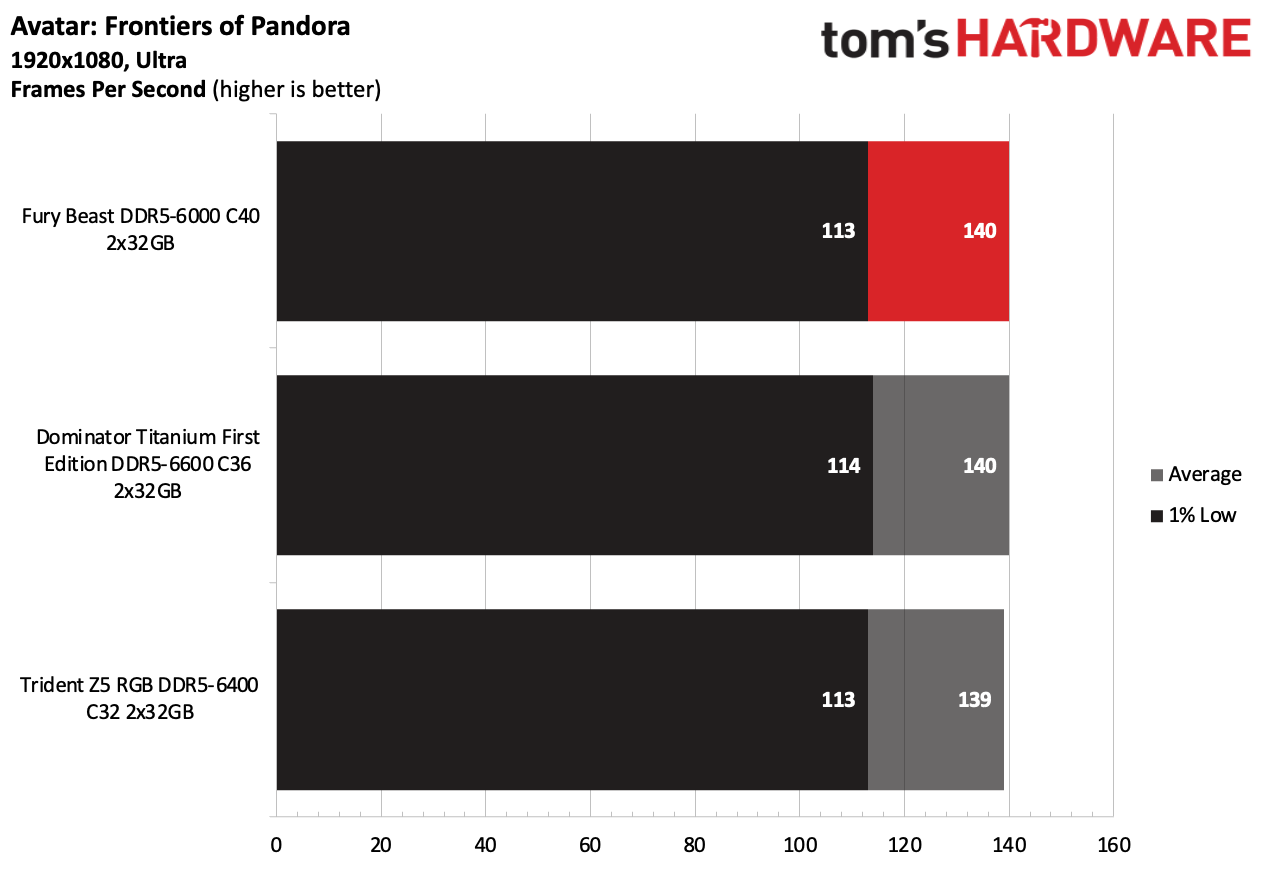
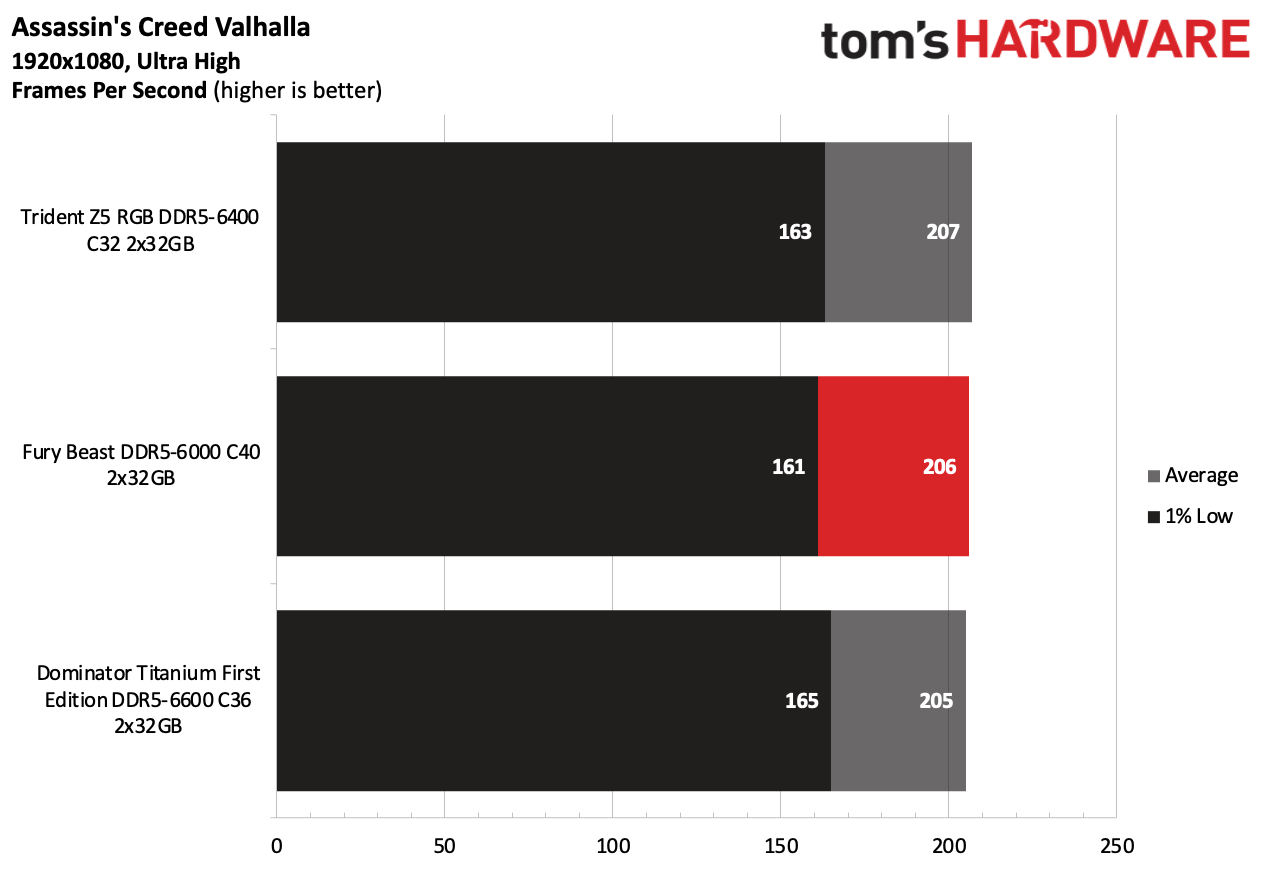
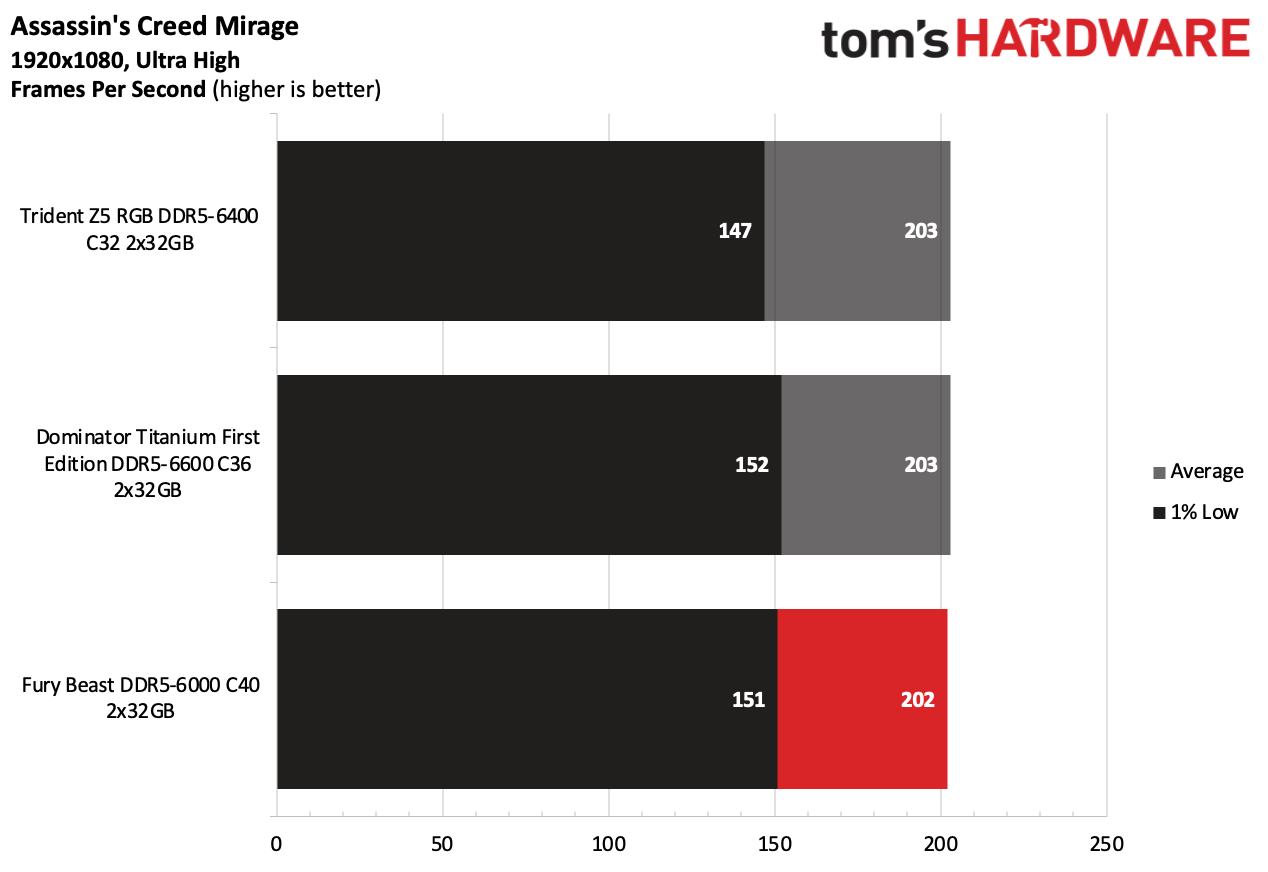
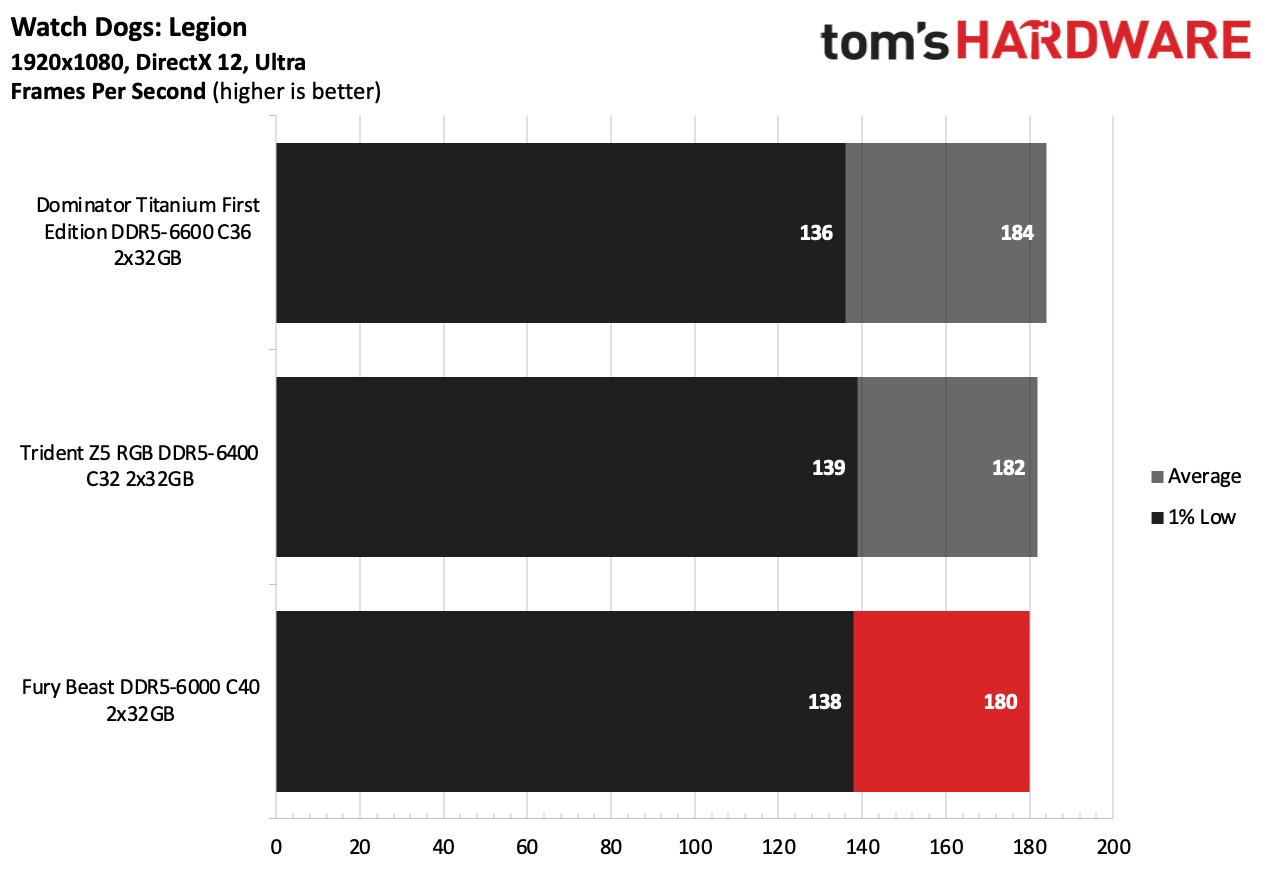
Despite inferior timings, the Fury Beast DDR5 was overall faster than the Trident Z5 RGB DDR5-6400 C32. Kingston's memory performed the best in the LuxMark v4 benchmark, surpassing all the other memory kits. Regarding gaming performance, however, the Fury Beast DDR5 was last on the charts, albeit by only 1 fps — an imperceptible amount.
AMD Performance
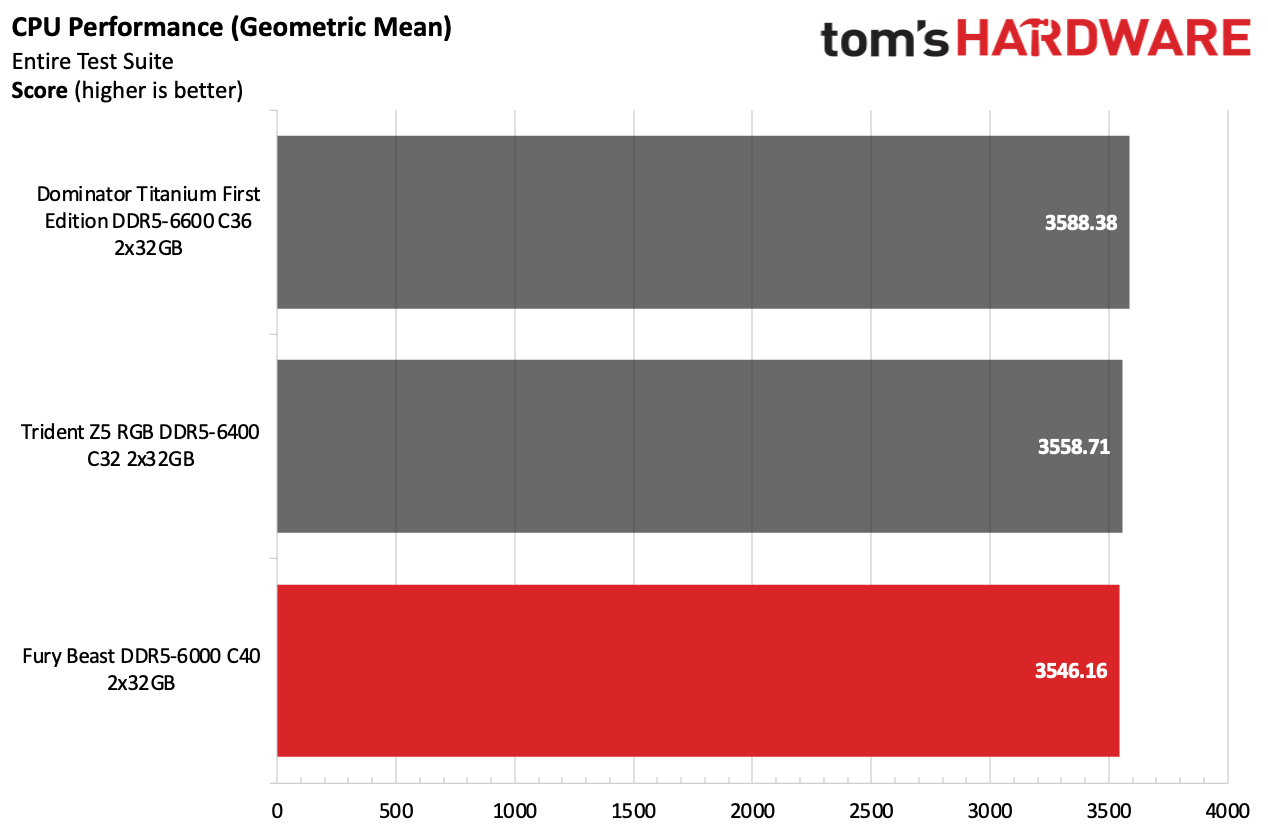
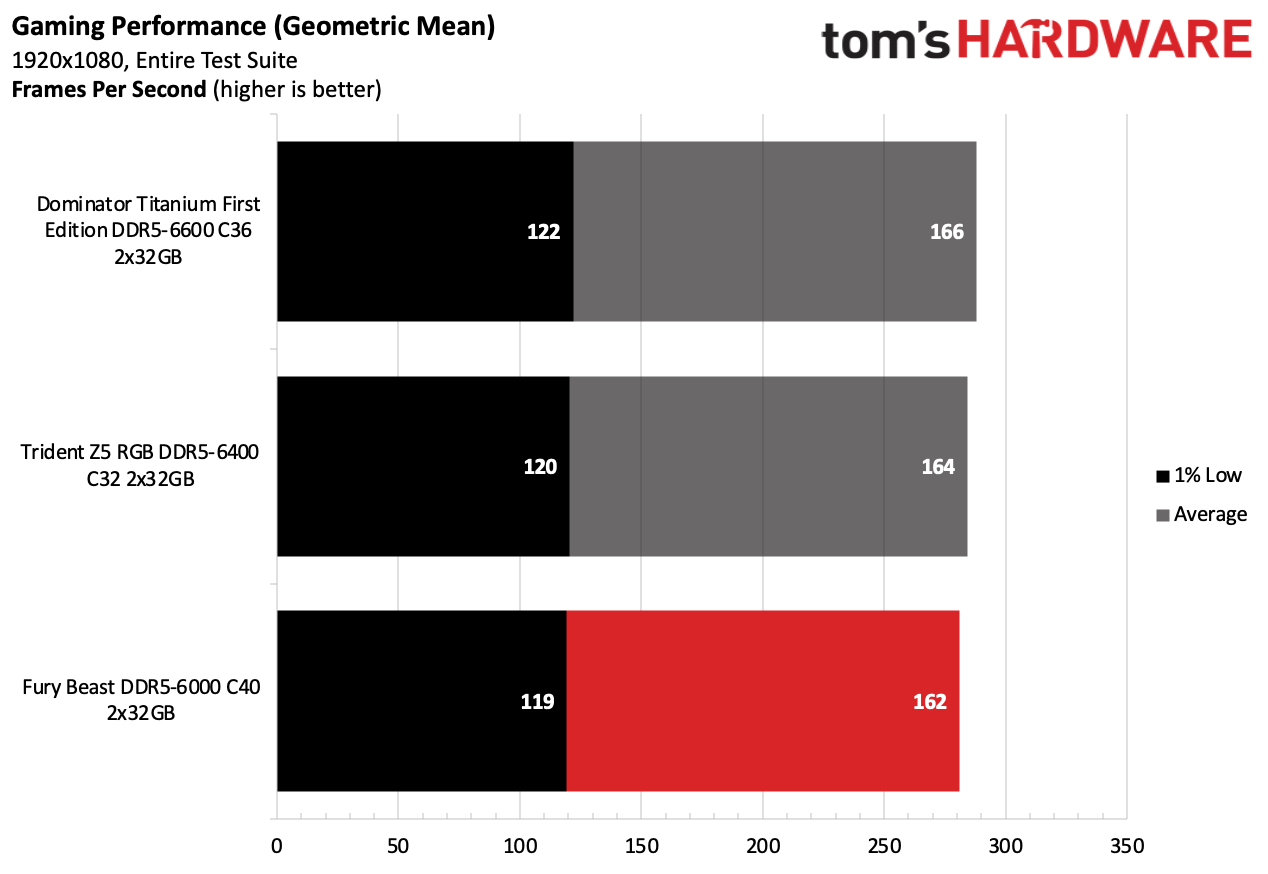
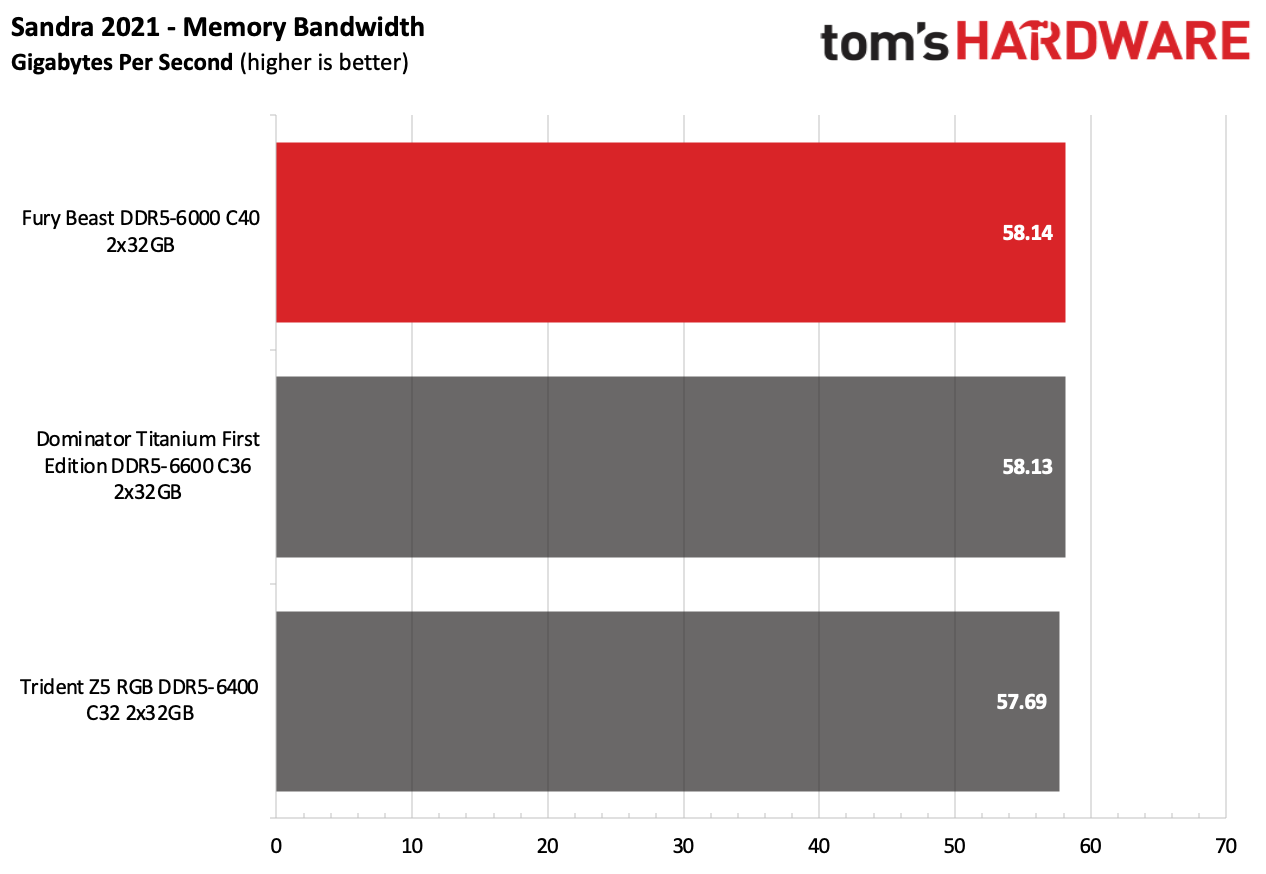
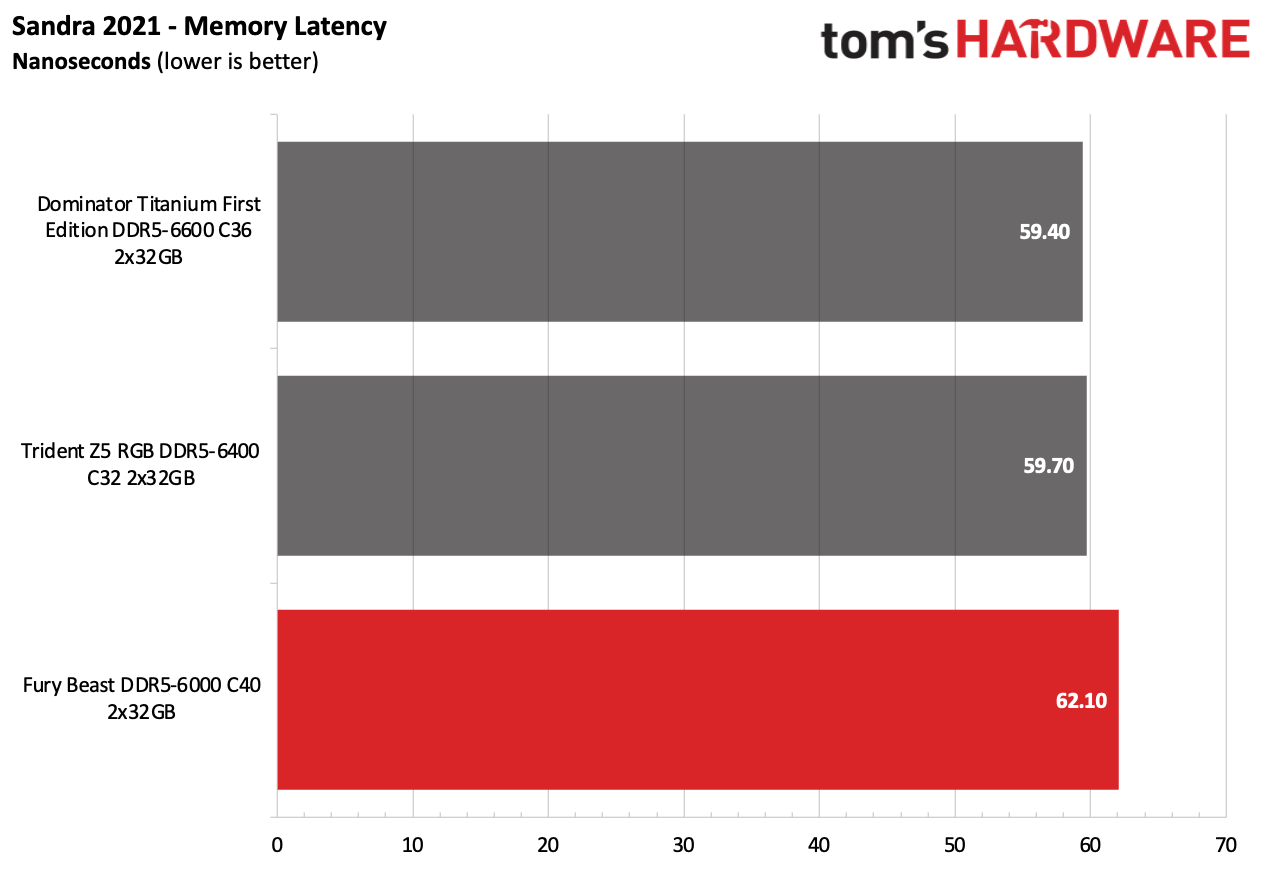
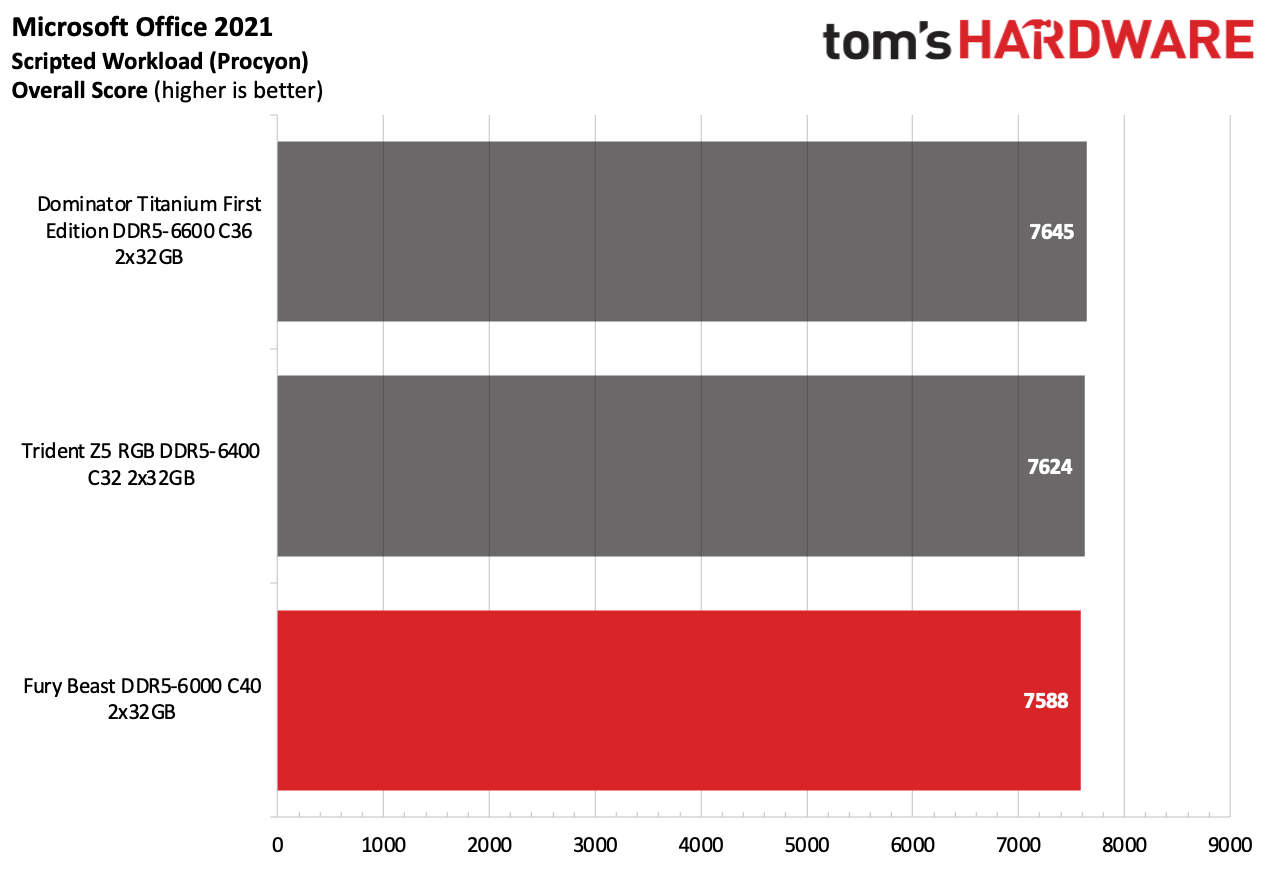
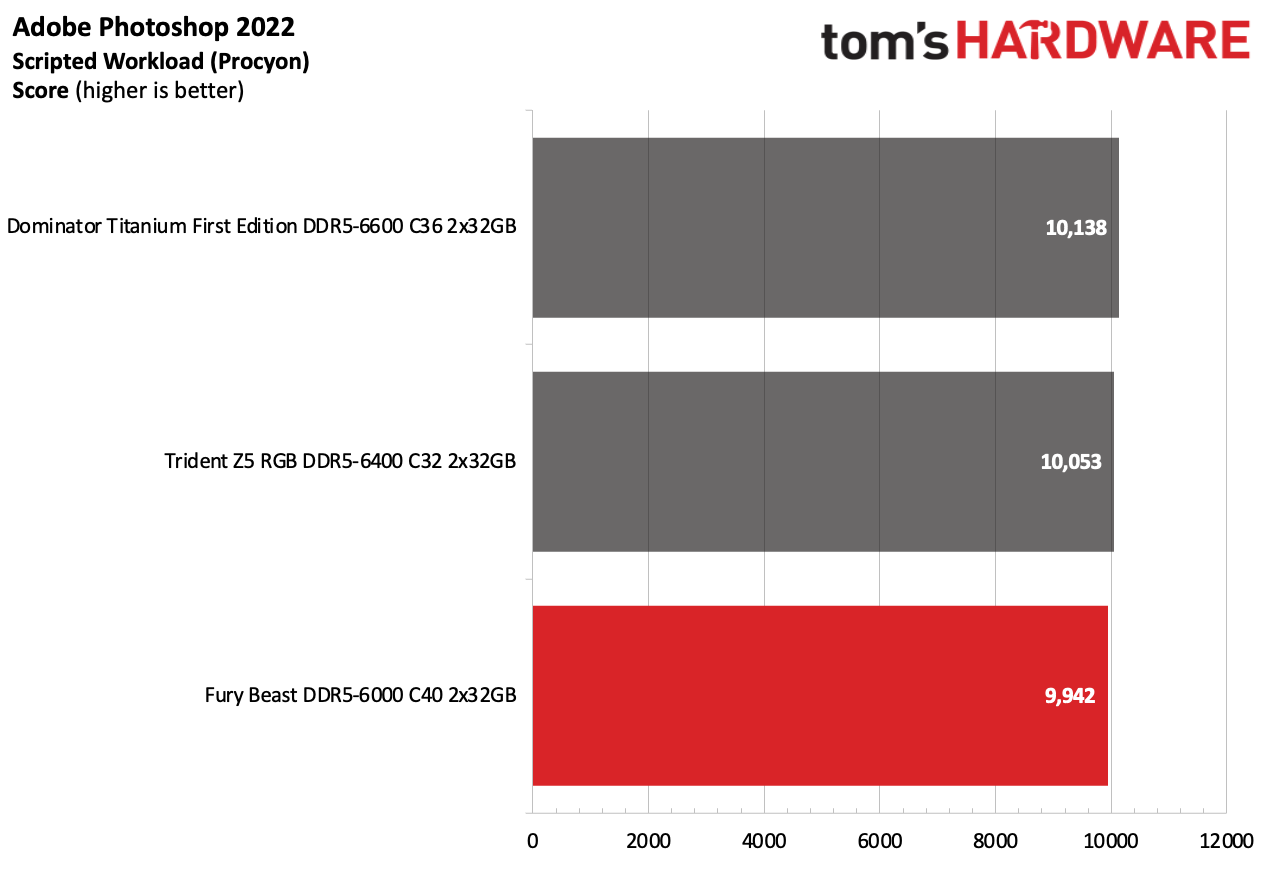
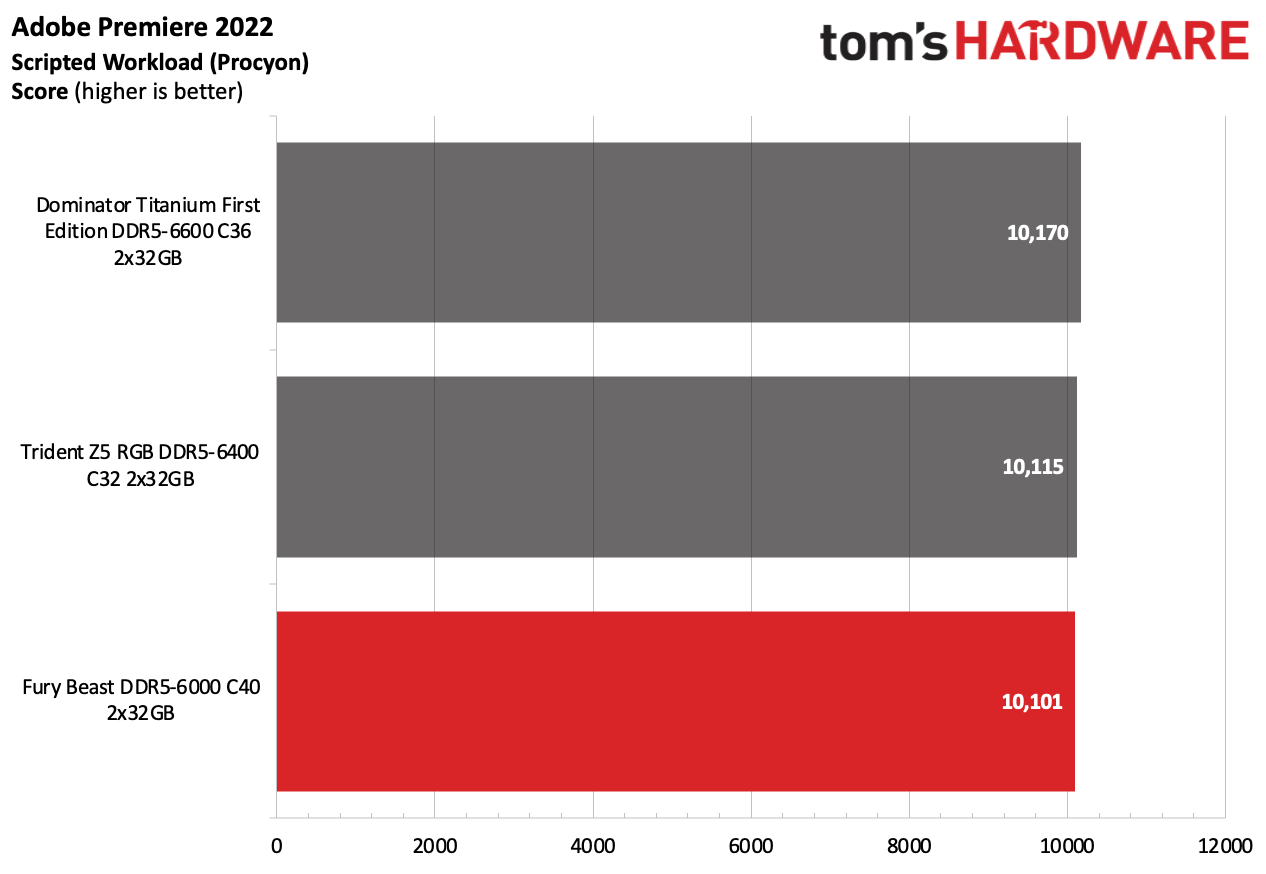
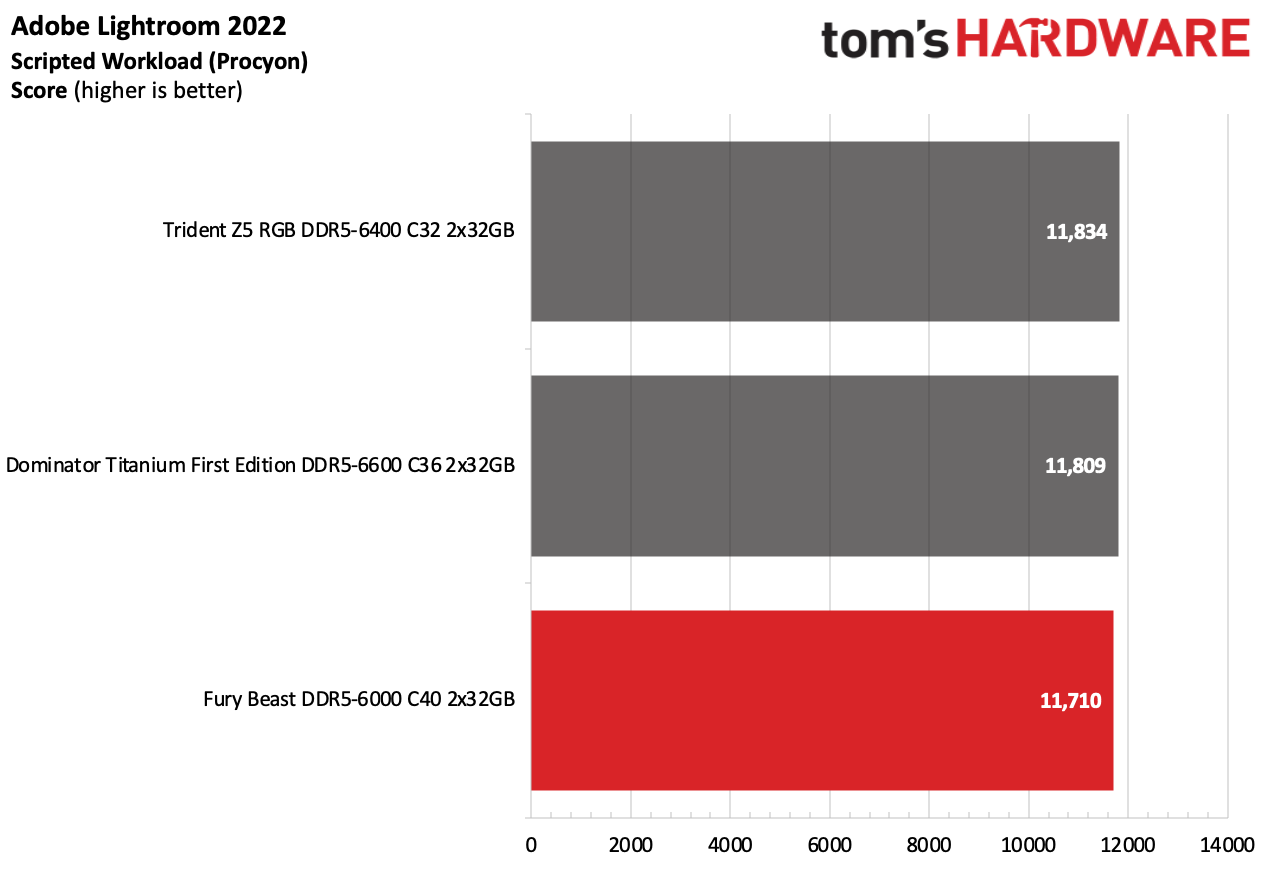
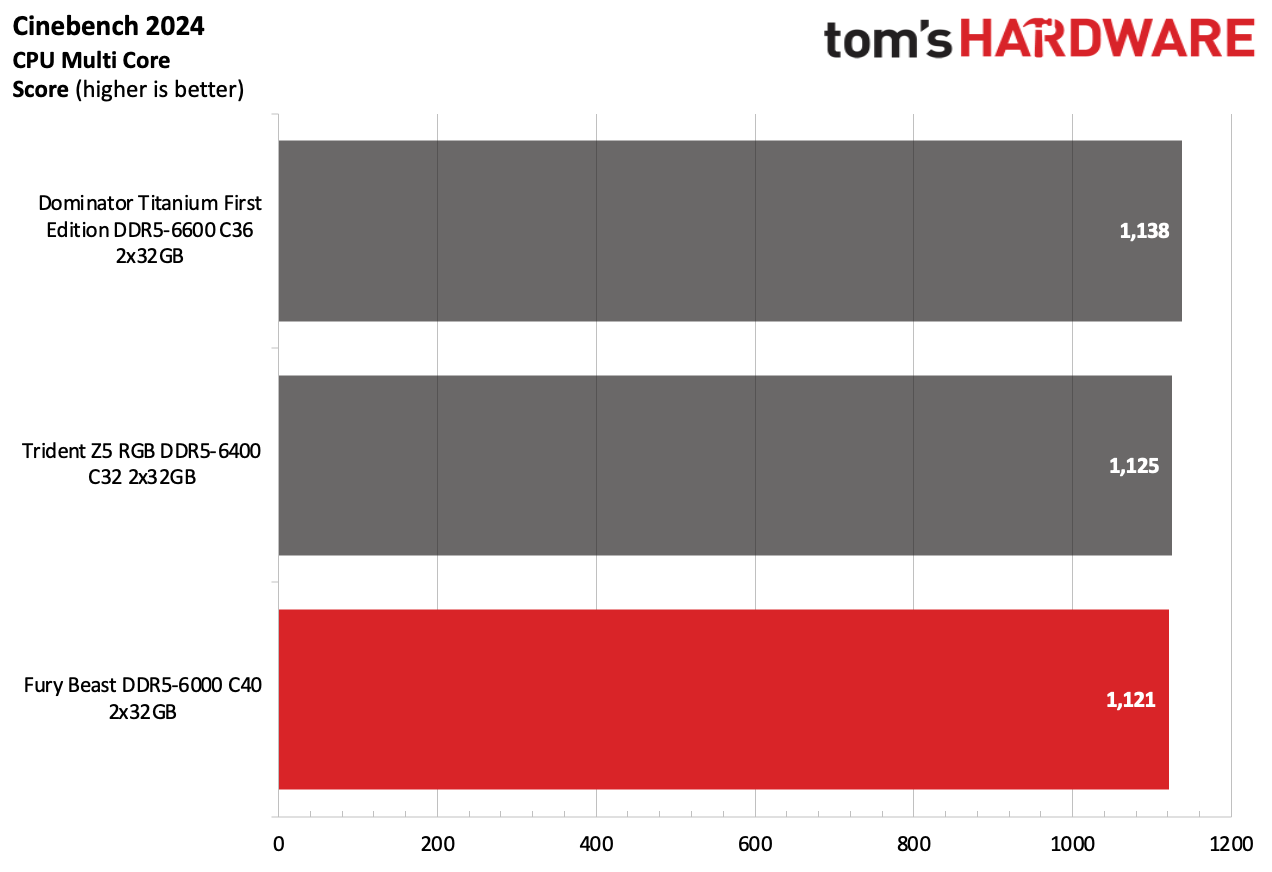
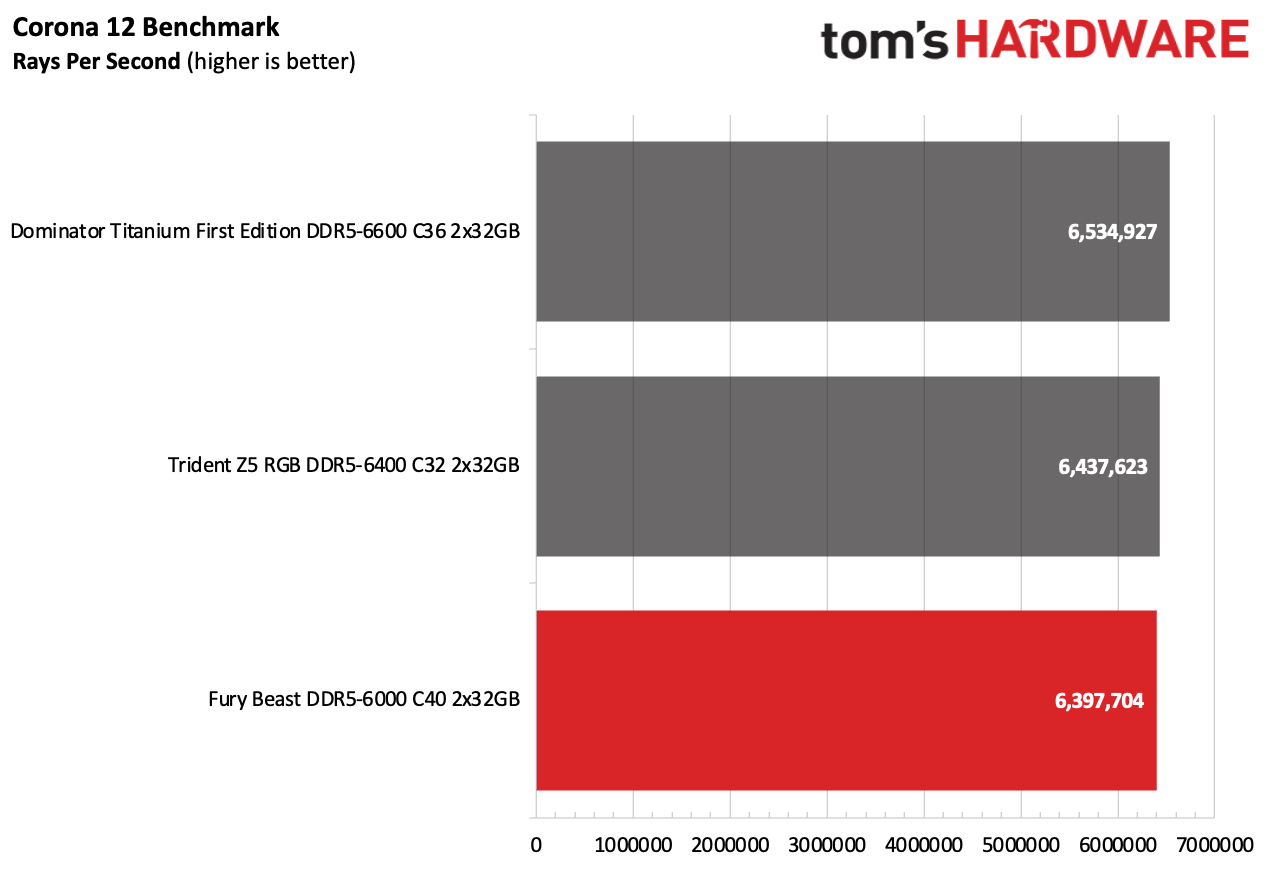
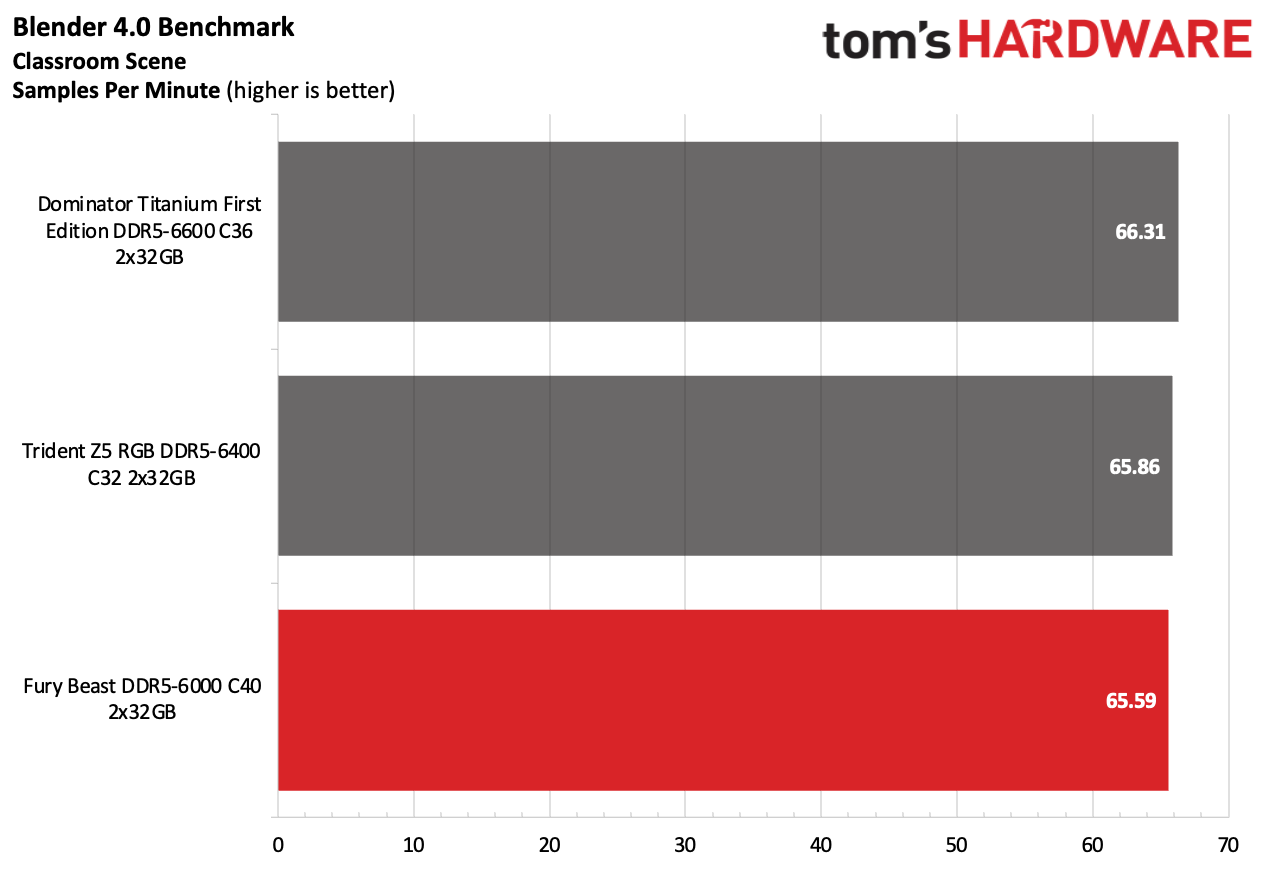
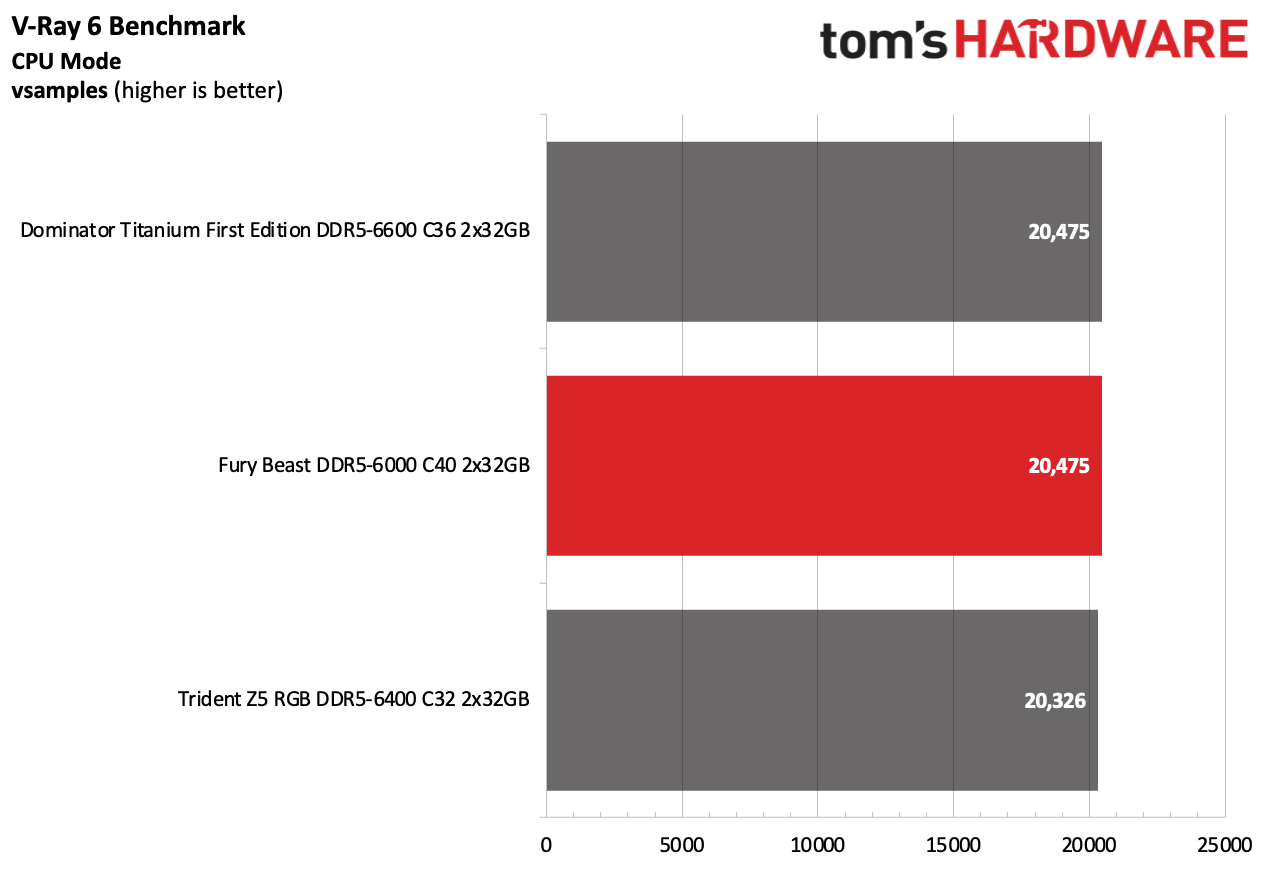
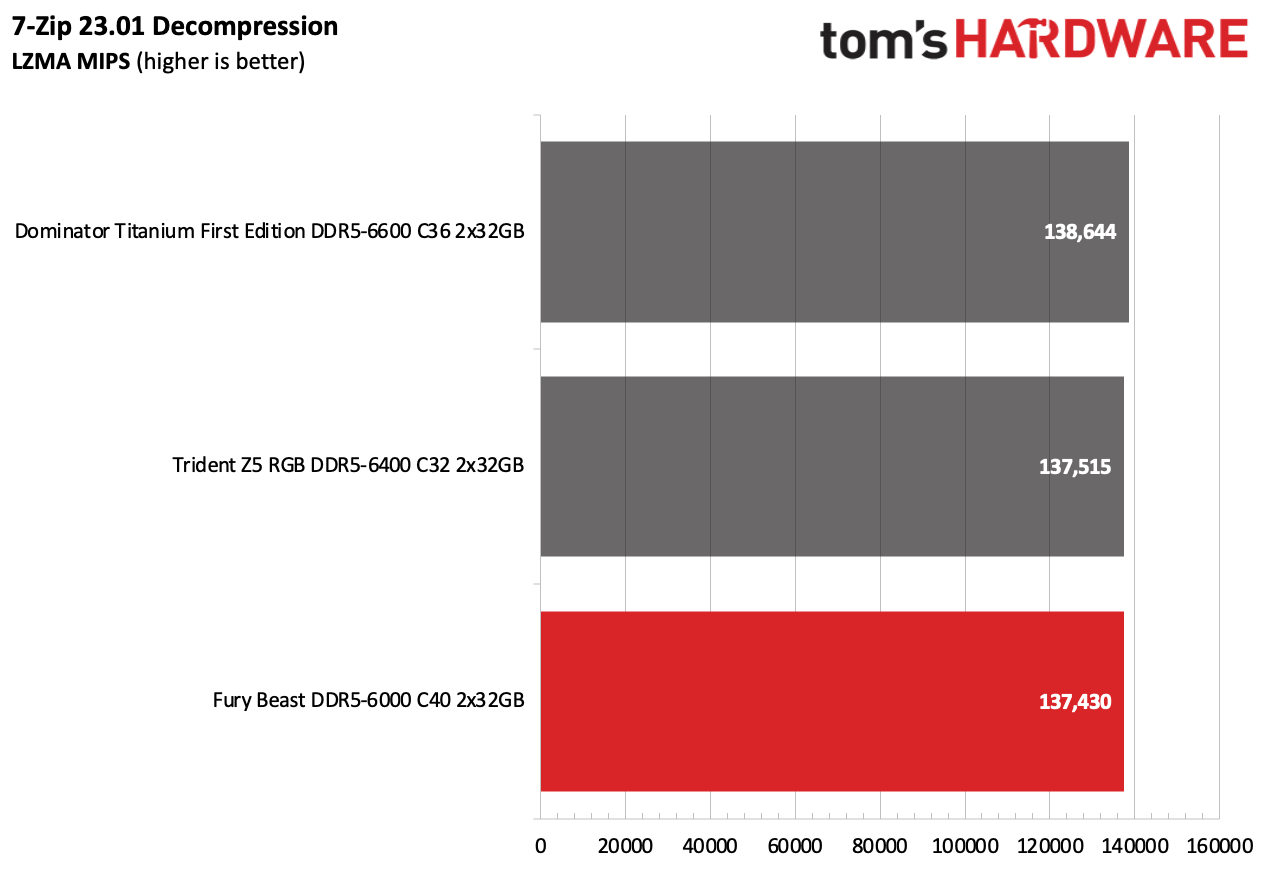
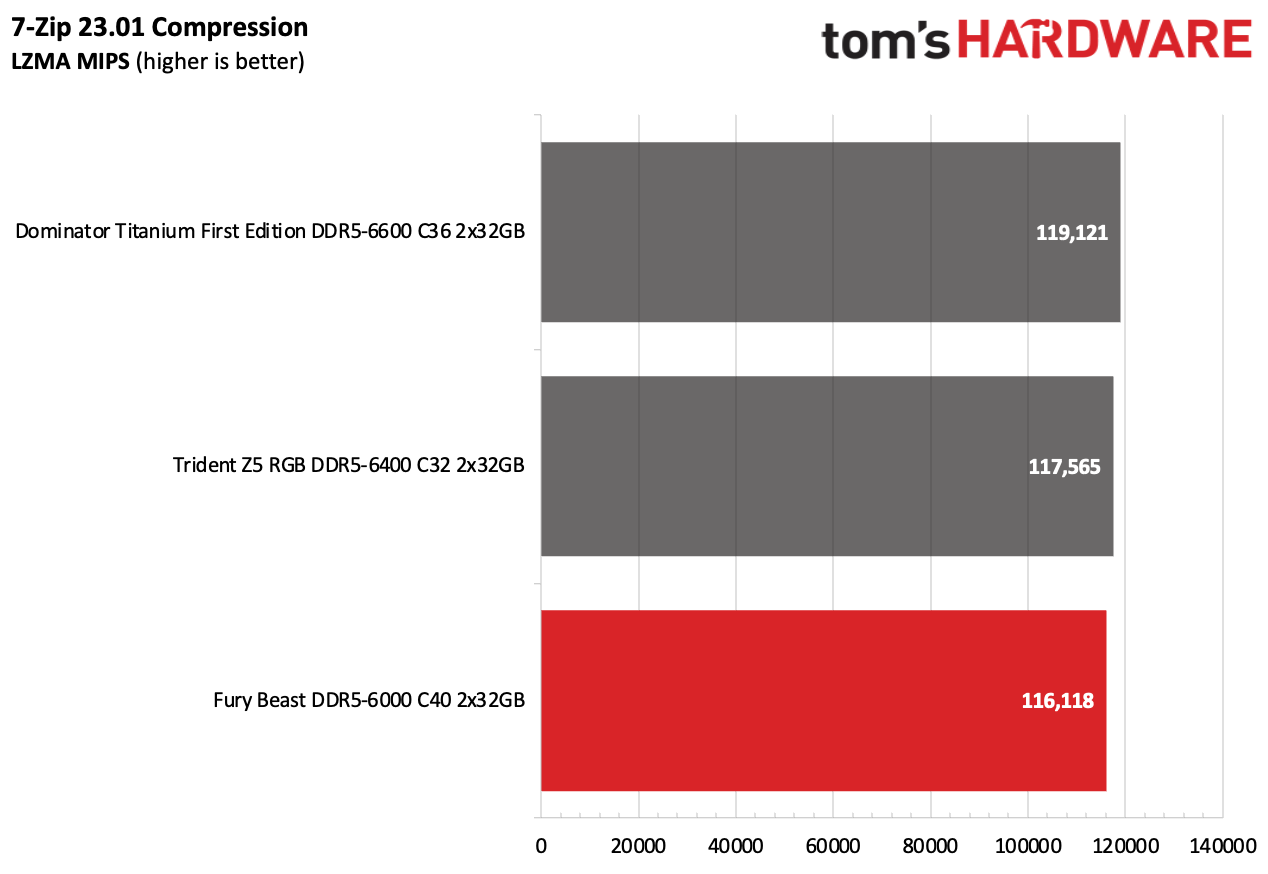
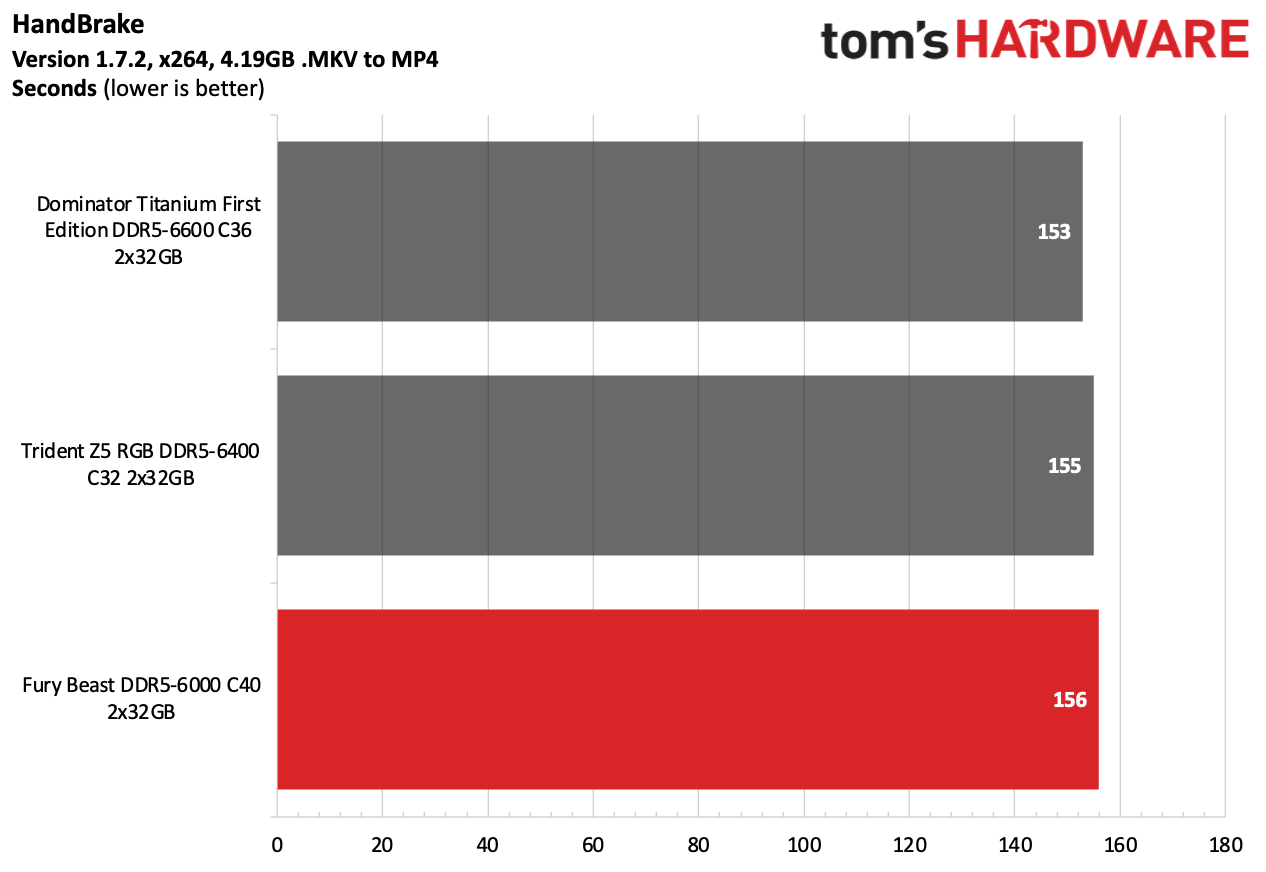
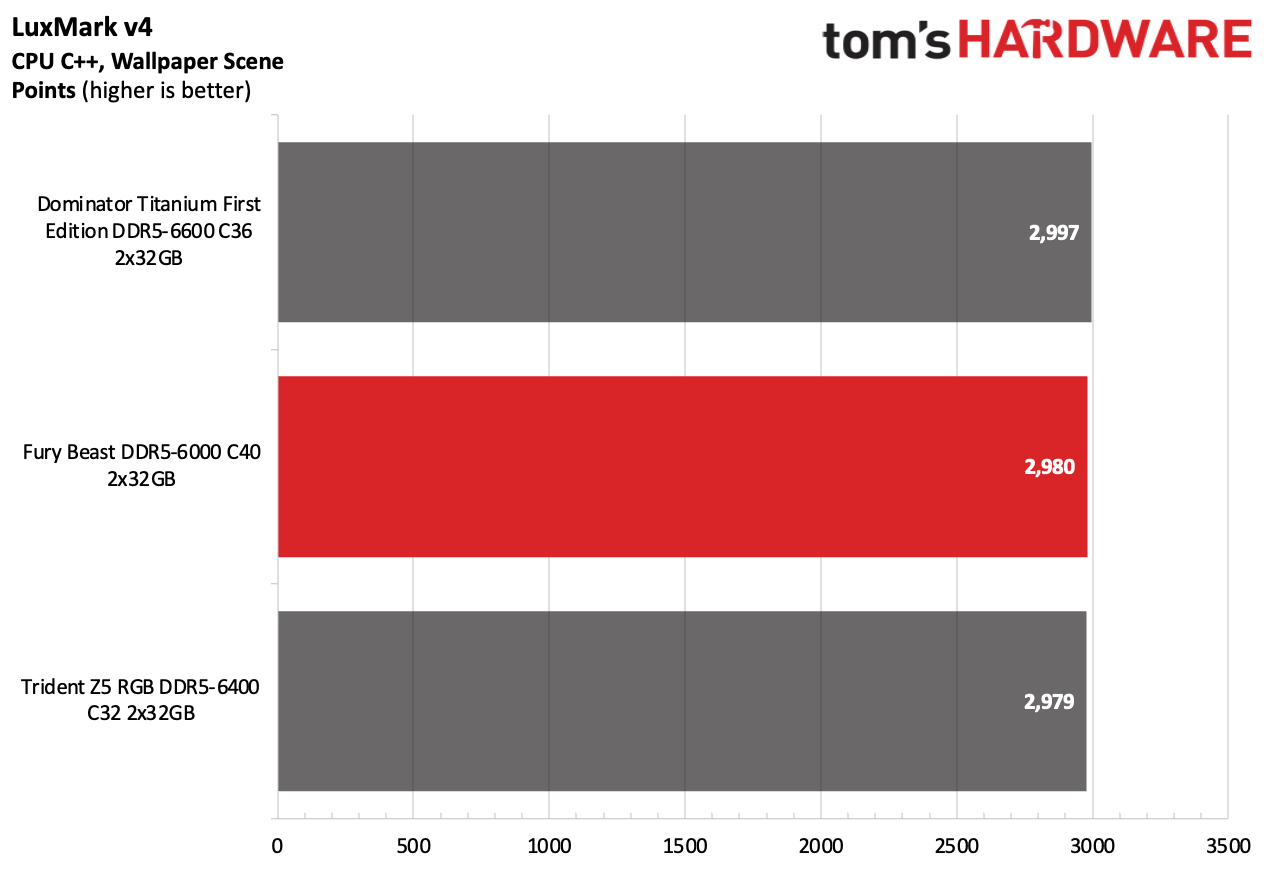
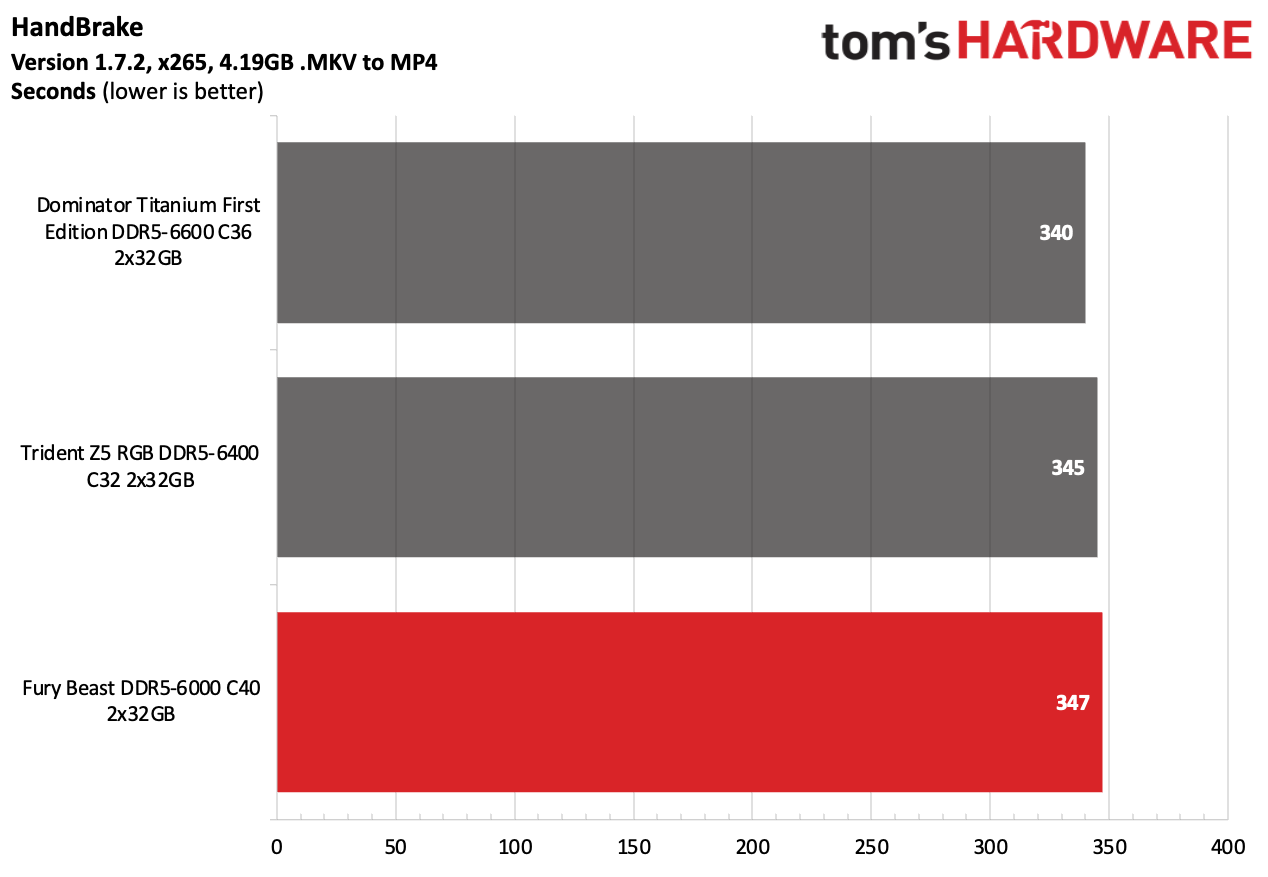
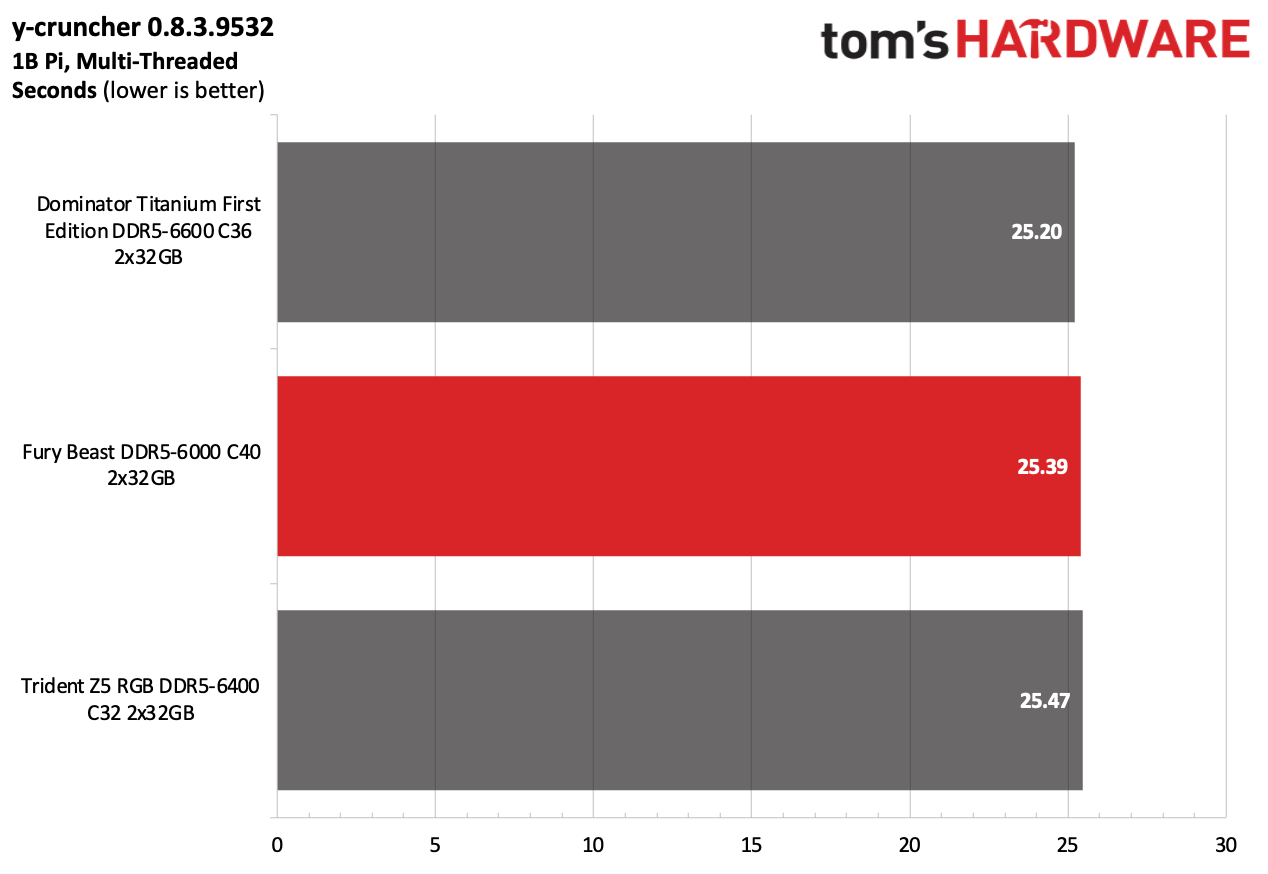
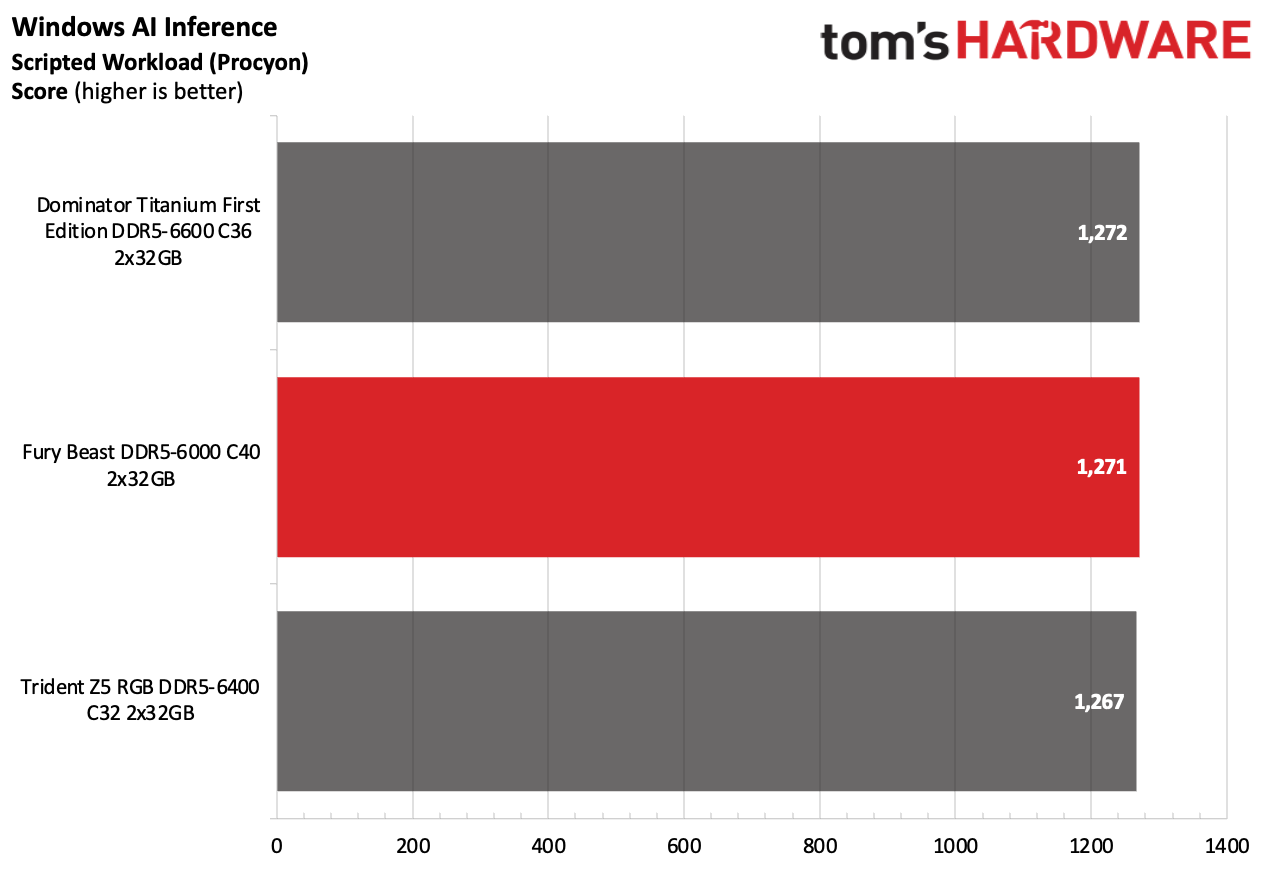
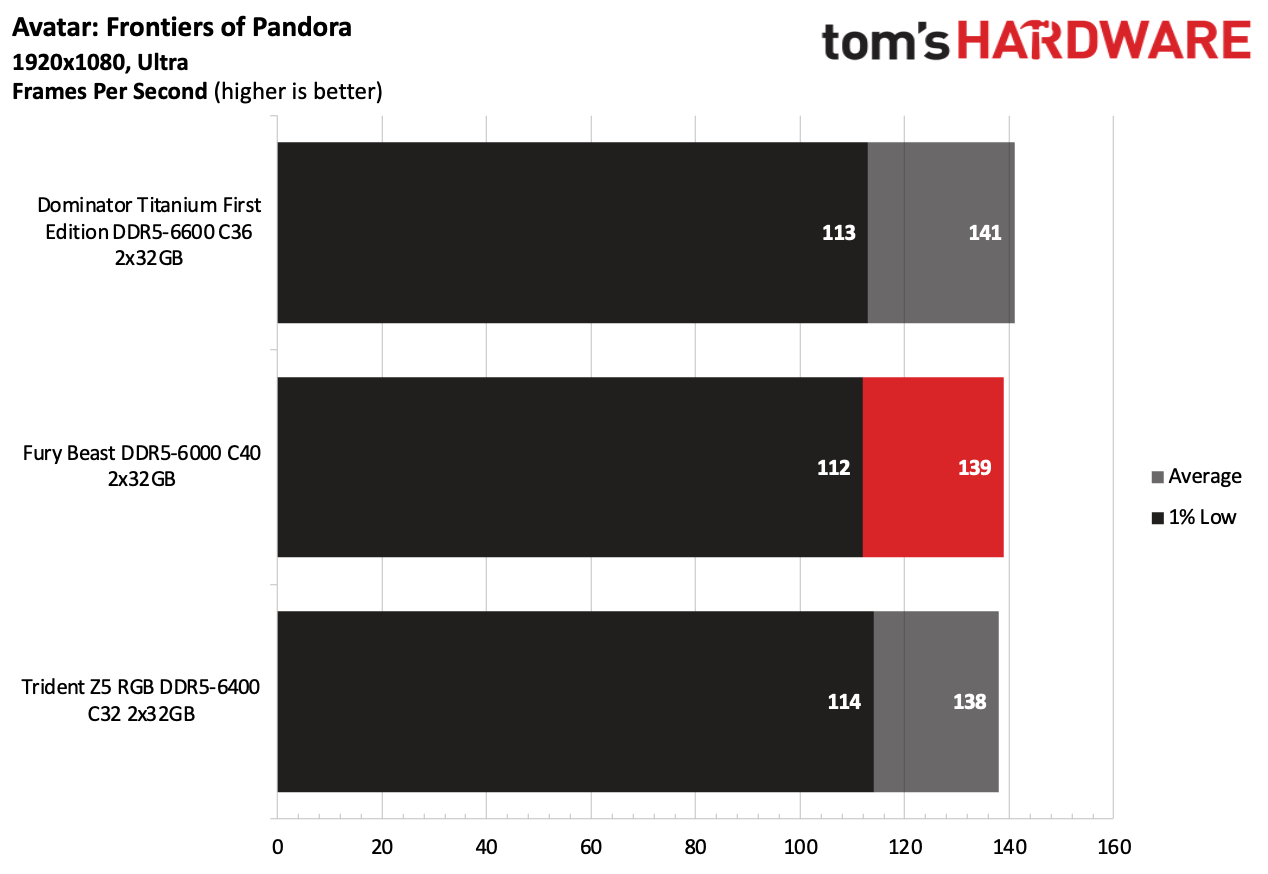
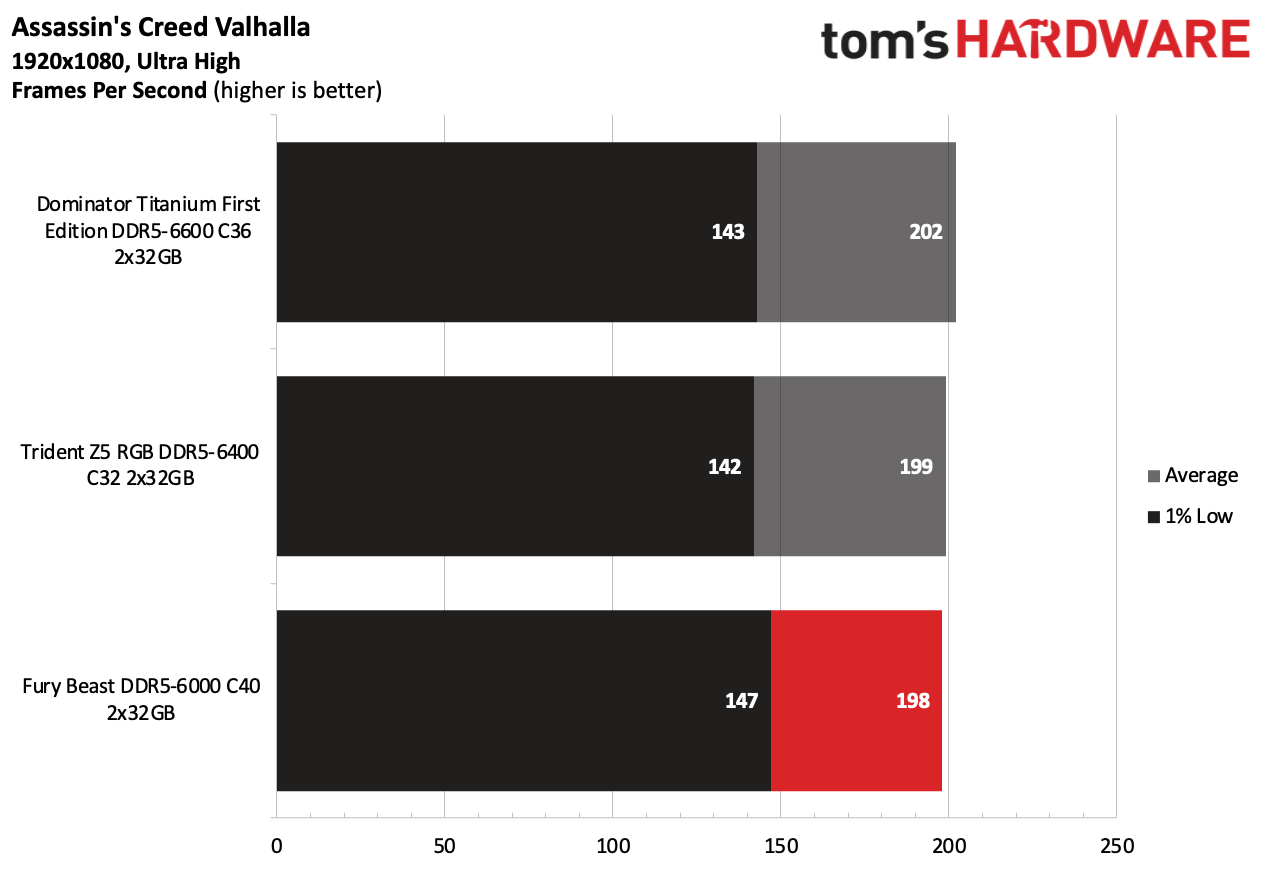
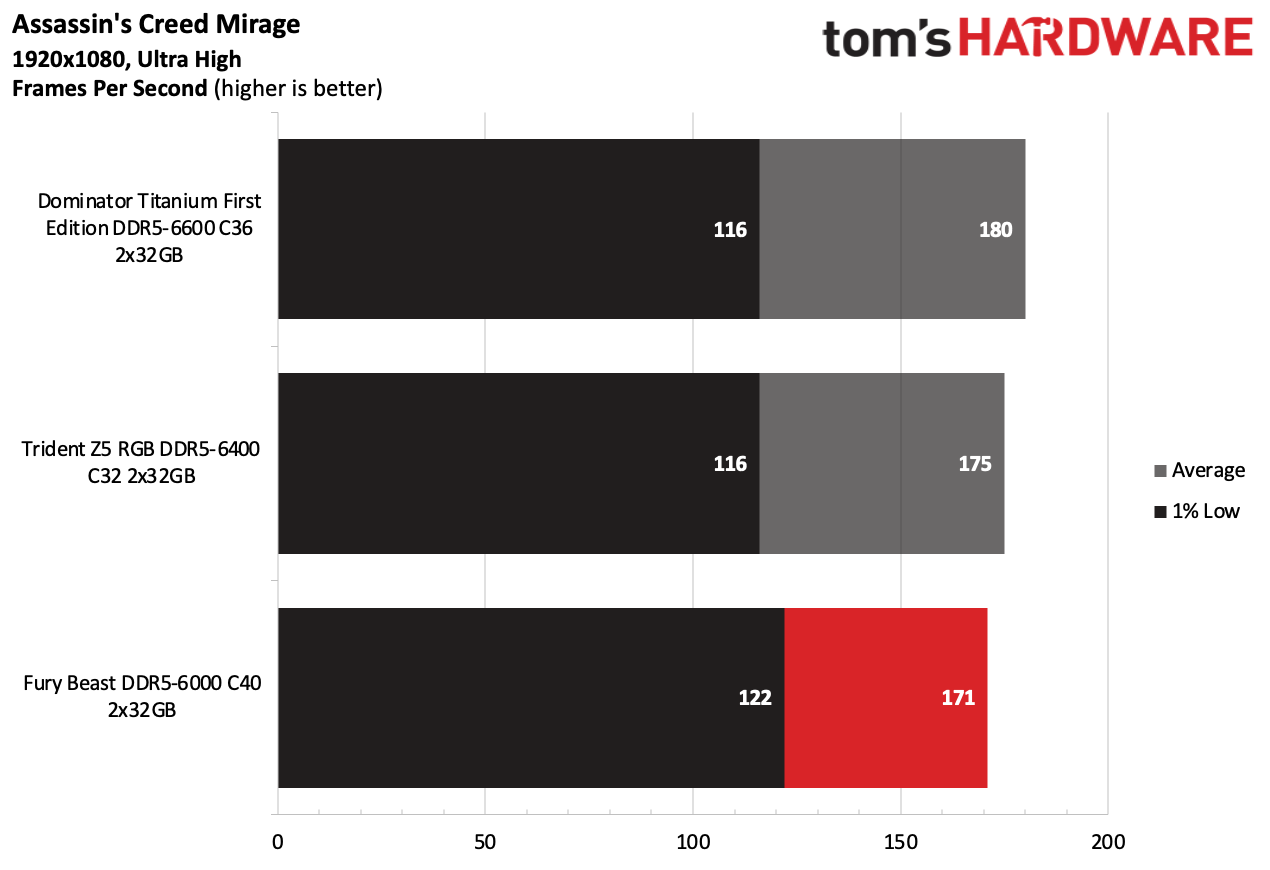
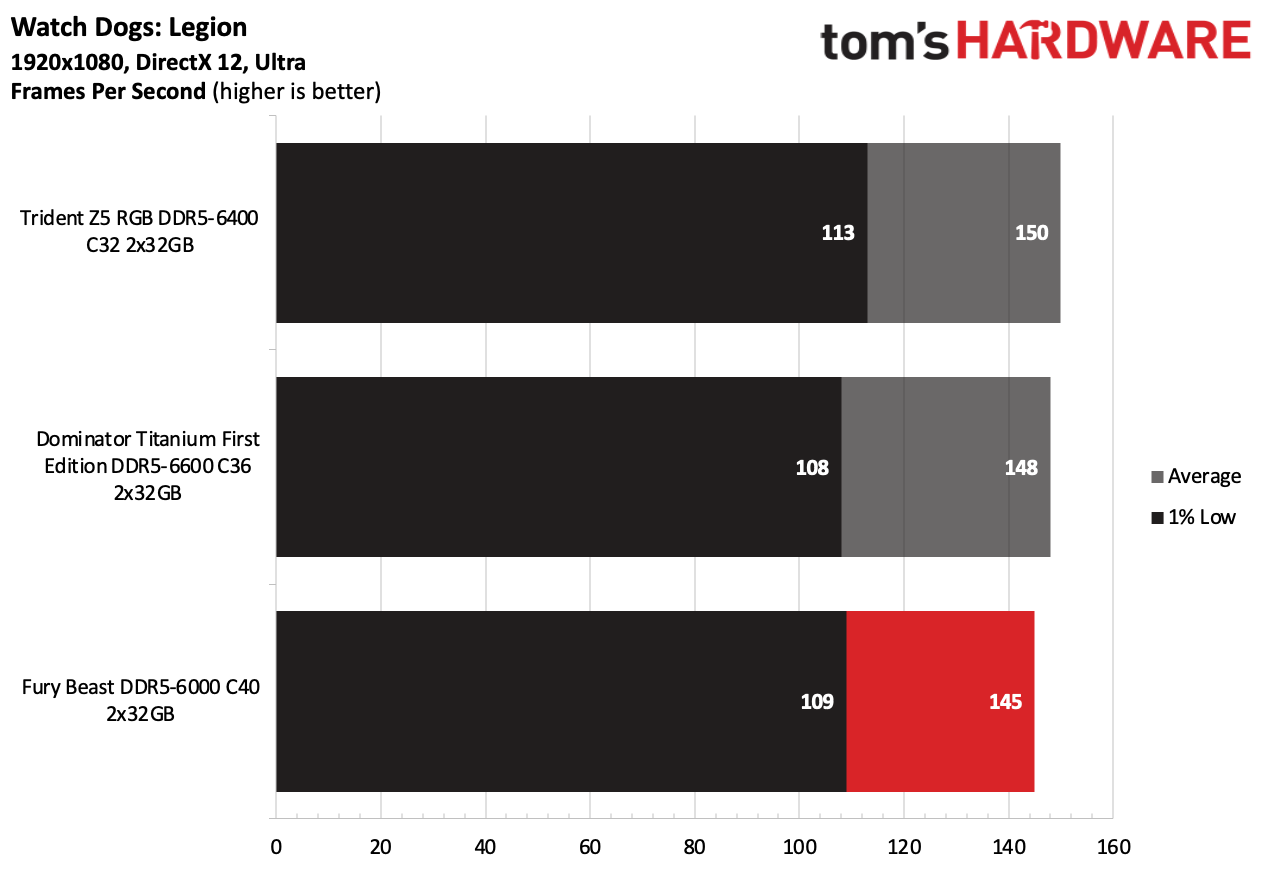
The Fury Beast DDR5 didn't exhibit the same level of performance on the AMD testbed. Cumulatively, the memory kit was last in both application and gaming performance and didn't overtake the Trident Z5 RGB memory kit. It didn't show any outstanding results in any of the benchmarks.
Overclocking and Latency Tuning
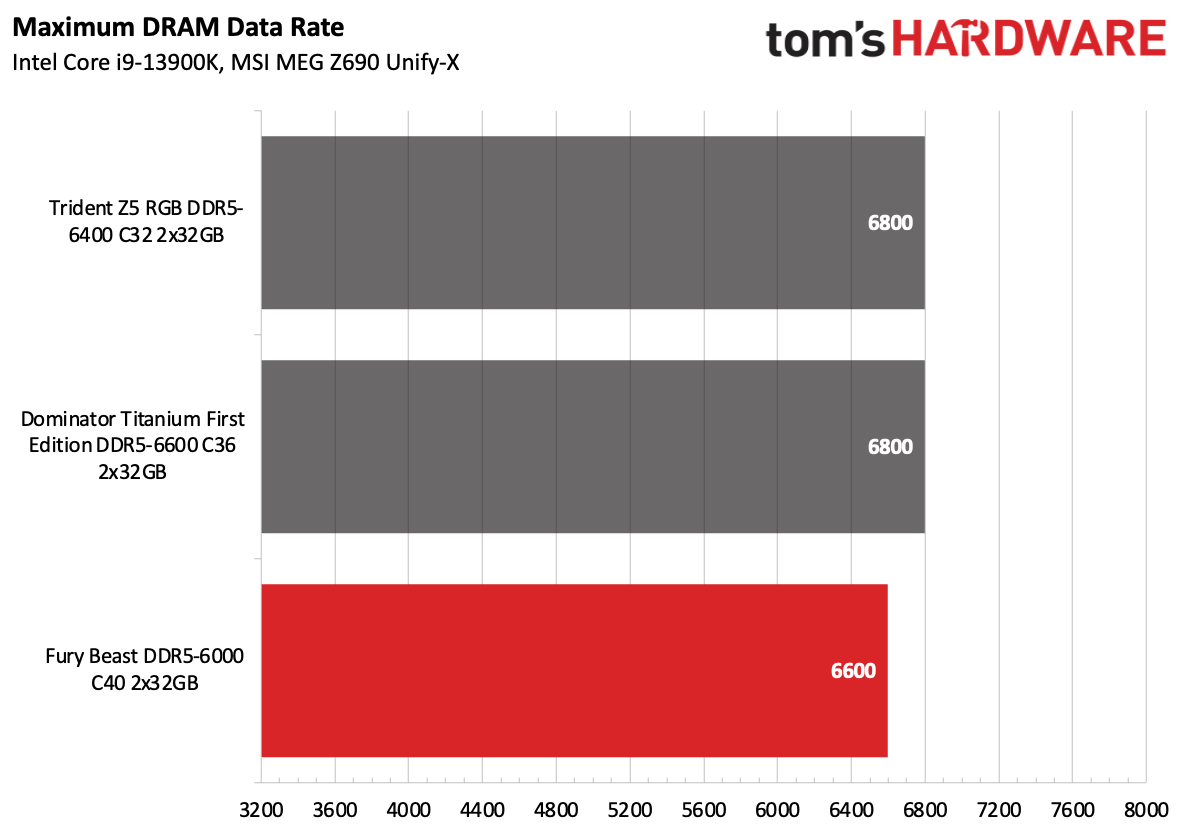
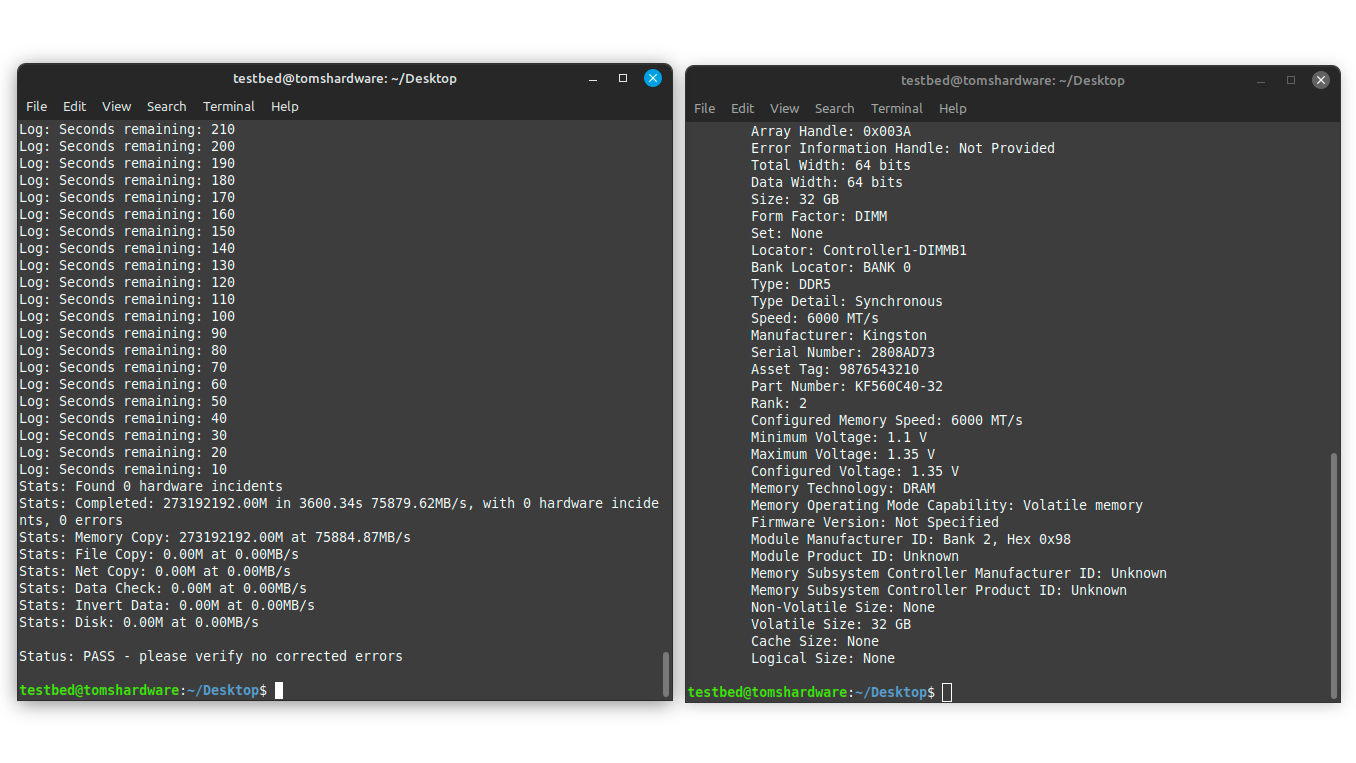
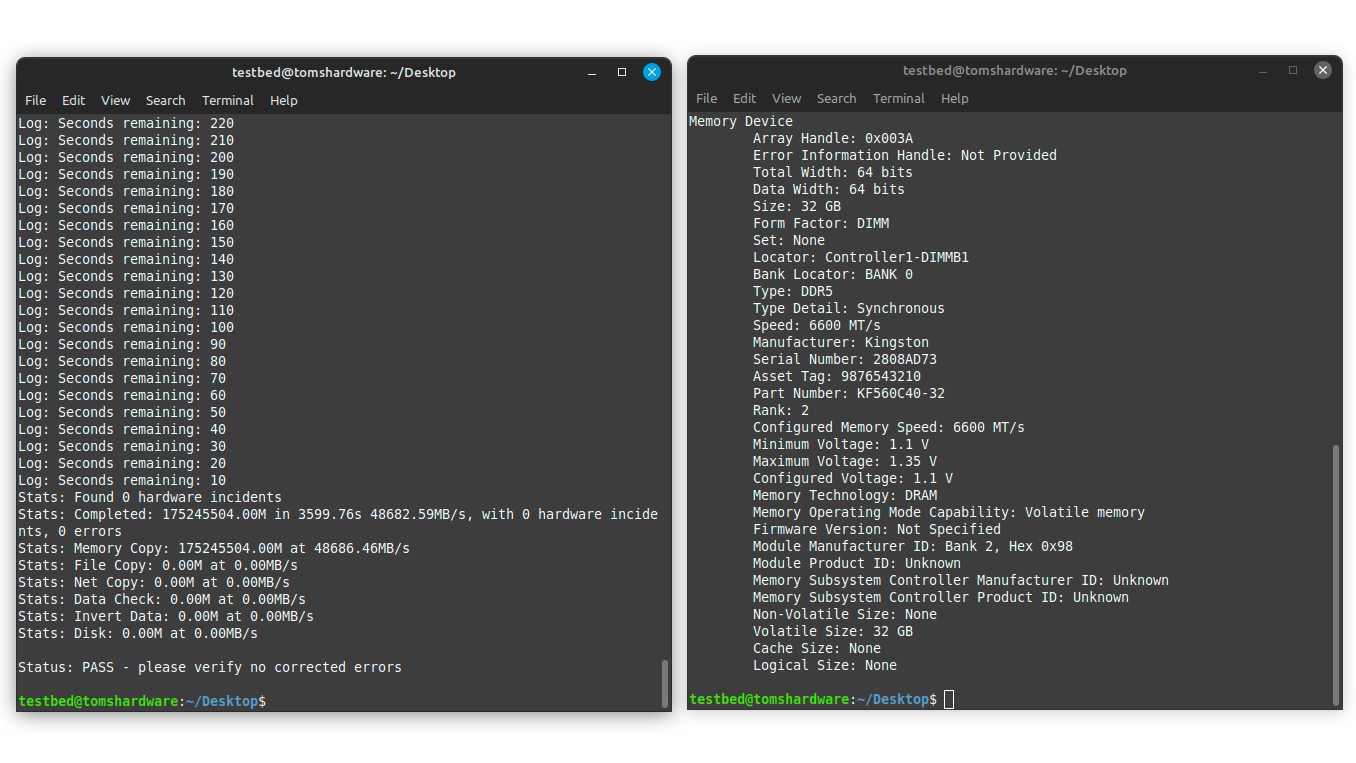
Pushing the memory to DDR5-6600 was extremely easy, thanks to the SK hynix A-die ICs. At 1.45V, we couldn't get it to the same level as the competition. However, optimizing the memory timings for DDR5-6600 was possible, lowering them from 40-40-40-80 to 38-38-38-78.
Lowest Stable Timings
| Memory Kit | DDR5-6000 (1.45V) | DDR5-6400 (1.45V) | DDR5-6600 (1.45V) | DDR5-6800 (1.45V) |
|---|---|---|---|---|
| G.Skill Trident Z5 RGB DDR5-6400 C32 | N/A | 32-37-37-77 (2T) | N/A | 32-39-39-102 (2T) |
| Corsair Dominator Titanium First Edition DDR5-6600 C32 | N/A | N/A | 32-37-37-76 (2T) | 34-39-39-76 (2T) |
| Kingston Fury Beast DDR5-6000 C40 | 32-34-34-74 (2T) | N/A | 38-38-38-78 (2T) | N/A |
The Fury Beast DDR5 has the very early timings when the first DDR5-6000 memory kits came out. However, if you run it at a higher voltage, there is enough room for optimization. For instance, using 1.45V reduced the timings to 32-34-34-74, a significant improvement over the 40-40-40-80 timings that the memory was binned for at 1.35V.
Bottom Line
If you’re in the market for 64GB, which sits around the sweet spot, the Fury Beast DDR5-6000 C40 could be what you’re looking for. The performance is okay but not great because the memory is stuck in the past with those sloppy timings when the early memory kits had launched. You can remedy this through manual overclocking, making the memory kit more competitive in performance. The memory kit focuses extensively on compatibility, from the compact design to the multiple XMP 3.0 profiles that ensure the memory kit works on all combinations of processors and motherboards. The memory caters to Intel platforms but should work equally well on AMD platforms.
The Fury Beast DDR5-6000 C40 has a retail price of $217.99, which could use a price adjustment. Competition with better timings in the DDR5-6000 category starts at around the $170 mark. Therefore, Kingston’s memory kit is considerably more expensive than its rivals, with superior specifications. At the current price, it costs the same as the flashier and, at times, faster Trident Z5 RGB DDR5-6400 C32.
- MORE: Best RAM
- MORE: DDR DRAM FAQs And Troubleshooting Guide
- MORE: All Memory Content

Zhiye Liu is a news editor, memory reviewer, and SSD tester at Tom’s Hardware. Although he loves everything that’s hardware, he has a soft spot for CPUs, GPUs, and RAM.
-
HideOut This review would have been relevant maybe 6-8 months ago when systems needed this as a state of the art. We are weeks away from releases that will require much faster RAM. And its overpriced! But hey, THG gets a cut if you buy from the link...Reply -
Heiro78 What's releasing that will be requiring much faster RAM?Reply
HideOut said:This review would have been relevant maybe 6-8 months ago when systems needed this as a state of the art. We are weeks away from releases that will require much faster RAM. And its overpriced! But hey, THG gets a cut if you buy from the link... -
emmjay28 Why bother with their legacy FURY Beast kit at 6000 CL40-40-40 when they have a new faster 64GB kit at 6000 CL30-36-36 with EXPO + XMP. Faster than GSkill and Corsair at both 6000 and 6400!Reply
